#and it's so so gay that even the protagonist's love interest acknowledges it himself
Explore tagged Tumblr posts
Text
Someone please ask me about my profile and header pic I'm getting desperate to ramble about SDIP
#sdip stands for 'star dream idol project' which is a manhua (chinese comic) about a survivor show#and it's so so gay that even the protagonist's love interest acknowledges it himself#i have so many thoughts about them but the fandom is so small i can't talk to anyone but my friends#at this rate i'm gonna make 'star dream idol project“ a tag myself#star dream idol project#sdip#星梦偶像计划#bunny talk
0 notes
Text
It’s funny that Bylers are so often accused of being delusional, because I was at my most delusional when I was anti-Byler.
I spent most of S4 refusing to acknowledge that Will had romantic feelings for Mike, despite knowing damn well what all that love triangle imagery and sad gay pining was implying. I convinced myself it was just bros before hoes drama; that perhaps Will wanted to come out to his best friend but felt nervous after six months of radio silence following “it’s not my fault you don’t like girls!”
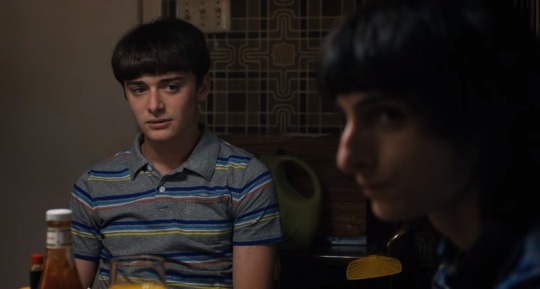
The van scene forced me to accept that he really was in love, and it pissed me off because what was even the point of making him fall for a straight boy?
Mike’s bizarre “no homo” behaviour was clearly a symptom of growing up in a conservative 80s household, and witnessing Will’s sacrificial act of love in the van was the shitty lesson he needed to get over his homophobia.
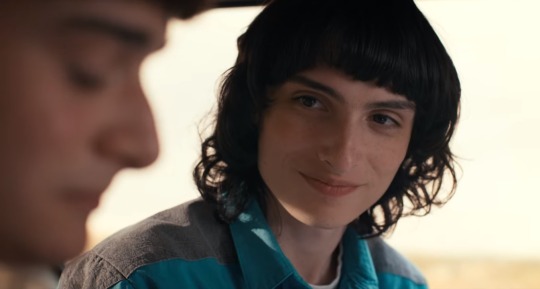
I saw a typical straight male protagonist in an 80s coming-of-age film getting to coast his way to self-actualization on the back of queer suffering; a cruel and homophobic trope I thought we’d moved past by the year 2022.
But then the NINA reunion scene rolled around--

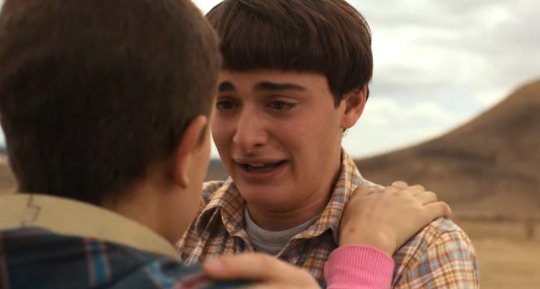
--and I immediately picked up on the heavy parallels between Mike and Will in how they greeted El. The realization hit me like a tonne of bricks: Mike feels the same way about her as Will does.
I thought, “wait, does this mean I was wrong about...? Oh my god. No way.
No fucking way.
Will was in love with El this whole time?? What the fuck, he’s been gay since S1 and she’s his sister this is BULLSHIT I will personally strangle the Duffers--”
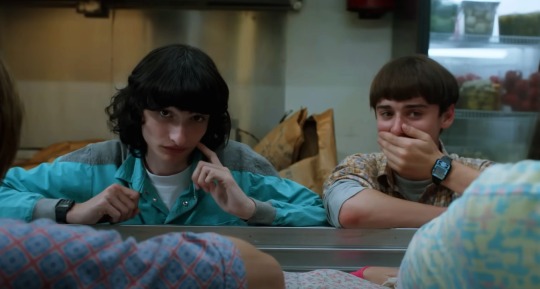
Heteronormativity is a hell of a drug, kids.
Let this be a lesson to those of you who think media illiteracy is to blame for Byler denial -- how well someone understands the mechanics of storytelling is irrelevant if they insist on treating Mike’s supposed heterosexuality as an axiom instead of an evidence-based conclusion. The issue lies with bias, not literacy.
I was stubbornly anti-Byler because I knew I’d immediately fall in love with this ship if I allowed myself to have hope it could be canon, and the general state of queer rep in mainstream media meant I was all but guaranteed to get hurt if I was so stupid as to have hope. But in my desperation to cling to the “safe” heteronormative outcome, I only ended up hurting myself with my own silly assumptions.
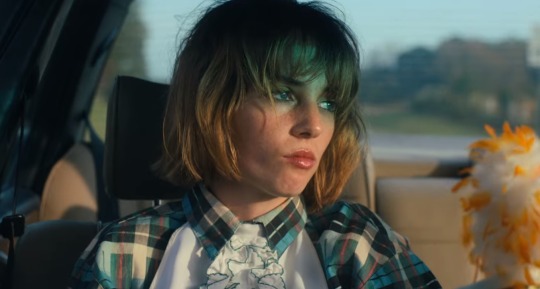
We’ve seen both canonically gay characters in the show make exactly this mistake, needlessly hurting themselves with their silly but self-defensive assumptions about their love interests.
Stranger Things absolutely nails its depiction of the subtler ways internalized homophobia can manifest -- Will may feel like a mistake and be prone to beating himself up, but he isn’t some pitiful self-loathing queer who wishes he was straight, either. He’s just so crushed by heteronormativity that he accepts it as an inescapable fact of life and lets it guide his beliefs and actions.
Don’t get me wrong: Will, like Robin, is very sensible for being cautious in such a horrifically bigoted environment -- trying to openly defy that level of homophobia by yourself, especially when you’re young, is a bad idea.
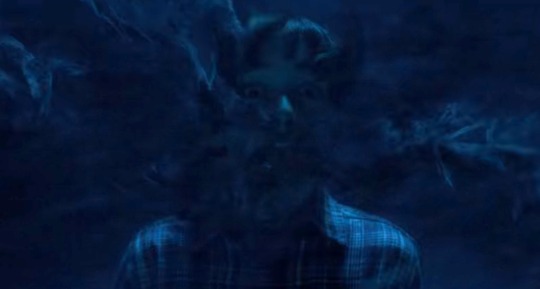
But unlike Robin, he clearly struggles to accept that he has the right to chase his same-sex love interest. He's no longer simply exercising caution, but conforming to homophobic standards -- much in the same way I thought I was sensibly refusing to be queerbaited, when really I was just agreeing with the heteronormative status quo.
I realize now that this is the real reason Will was written into a homophobic 80s trope: not to teach Mike an outdated lesson in acceptance, but to maneuver Will into position for the lesson he’s going to learn in S5 about resisting conformity.
Will needs to learn that castrating himself to make straight people comfortable is a bad idea too. Not only is that a miserable way to live his life, but what sort of world is he leaving for the next generation of queer kids if he never questions these homophobic standards?
It’s just the cycle of abuse scaled up to the societal level.
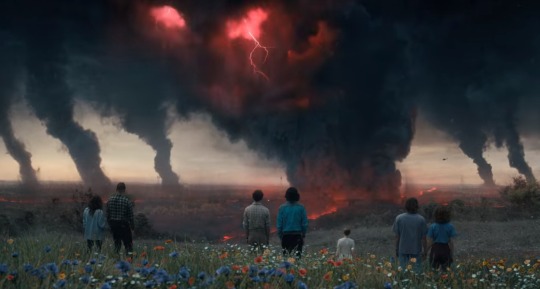
This is what gives me confidence in Byler endgame. Queerness isn’t just an incidental element of Will’s personal arc, but suffuses the show to its very core -- it’s in its themes, its allegory, its characters.
So Will getting the boy isn’t just nice fan-service for Byler shippers, but a necessary ending if the show’s most important lesson is to land:
That it’s rewarding to make the difficult choice of standing up to bigotry in the face of forced conformity. Of choosing love.
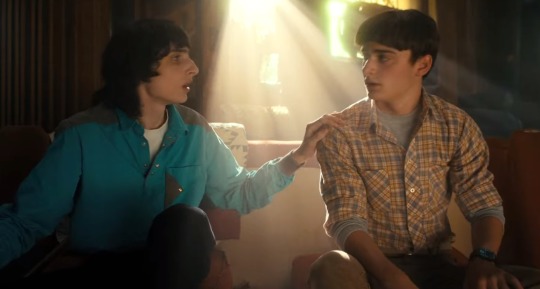
Could it be the case that I was right the first time, and Stranger Things is going to turn out to be yet another heteronormative mainstream show that doesn’t commit to its own themes? Sure, maybe. But that wouldn’t invalidate the valuable lessons this show has already -- and apparently accidentally lol -- taught me.
Anyone who calls us deluded for hoping a mainstream show is going to have a gay pairing as its main couple just doesn’t realize -- or doesn’t care -- that they’re contributing to the very problem they’re describing.
1K notes
·
View notes
Text
Wandee Goodday Ep 2 Stray Thoughts
Last week, we finally got a show with Drake and his beautiful eyebrows and ears, and he's playing an ace character, Kao, who is struggling with dating! Our protagonist, Wandee, is a doctor at local hospital and has been crushing on another doctor for eight years. He finally confessed and got crushed before embarrassing himself. He decided to go out and hook up to prove he wasn't vanilla, and drunkenly followed his recent patient Yoryak, a boxer, and somehow succeeded. Thor is also here as Yoryak's brother, and is in a committed gay relationship. I'm having a good time.
Not this man interrupting sex for constant reassurance.
Appreciating the blue to remind us that these guys have dicks.
"Once is enough." I love this man. He's gonna be so embarrassing.
Golf knows what the people need: Thor's tiddies jiggling.
Cher out here a whole liar pretending like he don't like that man's sweat.
Kao has incredible energy. I love him.
I swore when I saw Ter.
He really tried to talk over Dee! I hate him!
That was such a gay snap holy shit.
Ter is horrible. Where are my knives?
Interesting. Cher talks like Yoryak hooks up regularly. Does he care about all of his partners like this?
It's Rain's kidnapper! Danger, Will Robinson! Please don't typecast this man!
Wow, they were already planning to sell porn of them date raping this man.
If this dude comes back later and kidnaps Wandee I will scream.
Watching with @yankeebastard and he complimented the way the show is approaching Yoryak's bisexuality, by showing that he has genuine regard for Taem as a whole person, and reflected on the mild chiding she gave him during his care for Wandee. He sincerely listens to her, and takes what she says seriously even when she isn't around.
I think Oyei's pressure is really well calibrated. It's not too much.
Obligatory Golf cameo at the queer cafe.
Getting emotional about grandmothers again.
David and I are so relieved that we recognized AJ correctly on the first try.
I think it was petty who already wrote about the way Yoryak respects people's boundaries. I love the way he asked if Wandee wanted to do it, and then left on his own when he remembered what Wandee said about hookups.
I'm going to ascend. We got good ground rules for their relationship, and I really love that Yoryak asserted that Wandee needs to use his name. On top of that, we finally have a presumed bottom being clear that he wants his dick played with too.
The lighting department is doing wonders with the contours of their bodies.
I love that Yoryak made it clear that he wants to kiss and it's coming up in their hookups.
Wow, another banger episode. This is definitely the kind of grown content I have wanted out of the genre for a long time. Thank you, Golf Tanwarin. I'm going to be thinking about Yoryak and wondering at what makes him so sensitive to his prospective lovers all week. Let me also state plainly that it feels so important that we acknowledged openly that guys who enjoy taking dick also like to have their dicks played with, too.
145 notes
·
View notes
Text
'All of Us Strangers feels like the film Andrew Haigh has been waiting to make. Whether it’s his breakout feature, Weekend, or the HBO series Looking, this director is clearly interested in the idiosyncratic, lonely lives of certain gay men. There is a bittersweetness that comes with so much progress won in such little time. While many men are still reeling from the AIDS crisis and institutional discrimination, a new generation of voters has sprung up that takes gay prom kings and same-sex marriage for granted. All of Us Strangers is at its smartest when bringing these truths to light. It’s a little too polished for such raw subject matter, but this tender film deserves acknowledgement for spotlighting an overlooked – but very real – struggle.
All of Us Strangers may borrow its premise from the 1987 Japanese novel Strangers by Taichi Yamada, but it’s a loose adaptation. For maximum delight you should go in knowing as little as possible, but here are the basics: Andrew Scott is Adam, a screenwriter in his 40s just muddling through. His friends have all left London with their partners and children, and he spends his nights watching old TV and downing biscuits. Change presents itself in the form of Harry (Paul Mescal), Adam’s hot neighbor, and a new writing project. But as Adam mines his own youth for material, specters of the past step forward. Literally. Adam begins to spend much of his time with the ghosts of his dead parents, played by Jamie Bell and Claire Foy, who have manifested in his childhood home.
As he grows close to people — or spirits — again, Adam reflects on the culture that taught him to isolate himself. Too old to call himself “queer” instead of “gay” and too young to have spent much of his adulthood worrying about the AIDS epidemic or Section 28, Adam recounts a life colored by mundane discrimination. A classic “sensitive boy” with no athletic talent, he was alienated by peers and even his own father for not being manly enough.
There were seeds of this in Weekend, where the leads debated the drawbacks of flamboyance and blending in, but it’s satisfying to see things spelled out so clearly. With no cultural roadmap for growing up gay, Adam is stuck in arrested development, standing still in a hollow London high-rise while his friends happily embark on “real life.” His rendezvous with the past only emphasizes that inertia.
I’m not saying All of Us Strangers is a film about how sad it is to be gay – just a realistic one. There’s joy to be found in Adam and Harry’s budding relationship and the funny bumbling of Bell and Foy. Haigh’s signature visuals are almost unbearably pretty, with no golden hour left un-filmed. This film celebrates the good and bad of life rather than lamenting it. That’s mostly a lovely thing.
I say mostly because, well, it should be easy to make a raggedy, sad, bitter gay movie in 2023. And yet All of Us Strangers, Haigh’s first feature with a mainstream awards push – also his first with major distribution, via Disney’s Searchlight Pictures – plays nice. We already know Scott can volley from cynical to romantic on a dime (hello, Hot Priest), but while Adam has plenty of reason to be hard-hearted, he hardly acts it. In fact, the one time he does, the universe delivers him a brass-knuckled dick punch that, sure, makes sense for the plot – but still feels downright mean. Maybe Haigh wanted to make a more pleasant gay movie this go-round, but All of Us Strangers is a film that Glen, the sardonic, in-your-face protagonist of Weekend, would probably sneer at.
The film’s pat niceness is most glaring in its final scenes, as Adam’s story resolves in a way that is both too neat and also not really about Adam anymore. There’s nothing wrong with a gay movie with a broad, existential message, but damn. All of Us Strangers spends most of its runtime generating empathy for a guy who has shut himself off from the world, only to visit horrors upon him when he loosens up. Let a gay indulge.
Verdict
All of Us Strangers is all the things that will be trumpeted in its marketing: gorgeous, necessary, poignant. The cast is stacked, the visuals are breathtaking, and the subject matter is important. You’ve likely never seen a movie that tackles the specific loneliness many gay men still face today, and this one is laudable for that alone. However, All of Us Strangers airs on the side of saccharine, especially towards the end, and it would benefit overall from some more human ugliness.'
#All of Us Strangers#Andrew Haigh#Andrew Scott#Weekend#Claire Foy#Jamie Bell#Paul Mescal#Looking#Taichi Yamada#Strangers#Hot Priest
0 notes
Text
nightmare on elm Street 2 (spoilers abound but it's an old ass movie so.....)
- the tone is...less tense to start. and honestly just kind of loose and wishy-washy, compared to the very deliberate pacing of the first film, but it does build back to a more horror-movie like place in time.
- it's the same neighborhood, but unlike 1, which felt contemporary with the era, feels....rolled back in time? there's a very clear and purposeful 50's aesthetic in the house settings and the adult's clothing (and even in their personalities, to a certain extent, with the stereotypical sympathetic mom who doesn't begin to understand and the stern and rigid failed handyman father.)
- this movie also doesn't just have teenage sexuality, but really centers around it. (unlike one, where it's mostly a gag or just part of their lives, and also unlike other movies like the Friday series where it's clearly meant to be ogled at.)
- there's definite gay subtext, as it seems like the main guy goes to a gay bar and it's unclear whether it's under Freddy's influence in order to lure the coach away or if he chose to go there to try to do anything to relax/he knew they would let him buy alcohol (or even if he was a regular of some kind, was this his first visit?), as well as Freddy interrupting his first time having sex with his girl best friend, causing him to run away in horror and Lisa assuming it was because of her body. he also trusts his male friend far more than his female one, despite the male friend generally showing himself to be a lot more irresponsible and less caring (although not a -bad- friend, just less mature). it also lends itself to the reading of the fear that gay kids will prey upon their straight counterparts, because Freddy kills his friend in his own bedroom, while he's even awake. (in general, actually, Freddy kills very different people than his usual targets, which were previously exclusively sleeping teenagers. now, through the main boy, he takes awake victims and adults, too.) the female friend also, like the adults, is invested deeply in denial, and at first, doesn't really believe him, even when the evidence is clear (and even after Lisa believes him, she still denies Jesse's suffering, and that he should be able to defeat Freddy all by himself on willpower alone.)
- that's what I do like about this movie: it carries over the theme that what really lets Freddy prey upon Elm Street's residents-- not sleep, but the denial of both his danger and his existence. the way he's underestimated, only acknowledged as a part of reality in the deepest recesses of his victim's subconscious; the reality of his life and death also hidden from most allows him to continue to work as he does.
- back on the gay reading: I don't really adore it, despite the subtext absolutely being present, because it does imply Jesse's gayness is not just horrifying to himself and others, but definitely actually both dangerous and evil. and also, additionally, would quite literally cause him to prey upon children (like his little sister), it doesnt just reference as a fear, but pays credit to the validity of the groomer fear. I criticise it as so not because like, I think it should be Cancelled or there's no other takeaways, I just don't like how it reads to me.
- overall: it's an interesting film, and not the worst, but it's far from cohesive and not a great film. still probably a better use of your time than most of the Friday the 13th movies. but my recommendation? if you want a really good "protagonist struggling with becoming a monster and their love life" movie, just watch An American Werewolf in London. that one is subtle and compelling and also still has some wet bloody puppets and nasty body horror. even some jokes. all that great stuff. if you're just watching the nightmare series, I guess it's fine, though. the ending of this movie is also both really underwhelming and very similar to the end of the first one. I don't care for it.
0 notes
Text
Every Single Issue I Have With S*lki (It’s Not Just The Selfcest)
Here goes. I threatened to post this a few days ago and never did, but I just saw a s*lki stan Twitter account claim that Loki caring about Sylvie more than the whole multiverse was a Good And Romantic thing and it pushed me over the fucking edge, so now you all have to read this. I’ve divided it into categories cause there’s just THAT much.
OOC Bullshit
• First and foremost, no amount of mental gymnastics you do will ever make me believe that this specific Loki- the one that just invaded New York, that just came off a year of Thanos Torture, that just got done being influenced by the sceptre, that was literally in the middle of a crisis already, and then on top of that went through all the trauma of Ep 1- would even be worried about a romantic relationship. That would be the furthest thing from his mind. Go back and watch how he acted in Avengers- you think that guy would abandon his previous mission to become a snivelling simp for a girl he’d just met 3 days prior? Yeah, there’s no universe in which that makes sense.
• “It’s very in character for Loki to fall in love with himself lololol-“ NO, it’s literally not. Out of all the characters in the mcu, I don’t think I can think of anyone that genuinely hates themselves more than Loki. He even referred to all his other male variants as “monsters” and said meeting them was “a nightmare” in this series. He’s got so much self-loathing, plus the fact that he genuinely thinks himself to be an evil backstabbing scourge- so there’s no evidence at all suggesting that he would ever develop a fondness for, or even be inclined to trust, another version of himself, after only knowing them for 3 days.
• Building on that, the whole concept of Loki falling in love with a version of himself just feeds into the annoying ass misconception that he’s a narcissist. No matter which way you stack it, he’s not. If you’re referring to NPD, he doesn’t fit the criteria, and if you’re saying “narcissist” just as a slang term meaning “selfish and arrogant”, that still doesn’t accurately describe him. But when creators like Waldron and Herron do things like having him fall in love with himself, it makes it so much easier for casual viewers to think that he is.
Shitty LGBT Rep
• It’s kinda sus that Loki’s are allegedly genderfluid and yet the only female-presenting variant we see (and apparently the only female-presenting variant there is, cause the male Loki’s all seemed unfamiliar with the concept) is treated as some kind of mind-bogglingly special paradox. Also very sus that, out of all the Loki variants, the one our Loki falls in love with just so happens to be the only female one. What a coincidence.
• The fact that the creators of the show went around bragging about Loki’s bisexuality and Marvel purposefully (lbr) allowed stories about Loki possibly having a male love interest to circulate, specifically enticing queer viewers to watch the show (you know, the definition of queerbaiting), and then instead of having a male love interest (Loki was the first queer main character, so it was the perfect opportunity) they gave us *gestures to this dumpster fire* this… it’s just a middle finger to LGBT fans. The fact that they would rather have this relationship with all its myriad of problems than have a gay relationship is just……. Very telling.
• While him being with a woman obviously doesn’t refute his bisexuality, the fact that they showed/talked about him being interested in 3 different women (flight attendant, Sylvie, Sif) and never even hinted at him being attracted to a man, definitely makes it seem like they were trying to cover up his bisexuality to smooth things over with the more homophobic viewers. You know? It’s like “I know you’re pissed that we sorta confirmed Loki as bi, so we promise we’ll never mention it again! Or even hint at it! As a matter of fact, we’ll give him lots of female lovies and make him seem as straight as possible! That’ll take your mind off of that horrible crumb of queer rep, right? Please please please keep giving us your money!!!”
• Aside from all the other issues, at its core, the biggest reason why I think I’m so irritated with s*lki is that it took one of the most interesting, complex, and diverse characters in cinema atm and squished him into a tired ass unnecessary heteronormative subplot…. Like literally every. single. other. protagonist. ever. Loki is such a unique character, and it’s so so so incredibly disappointing that they stuck him into that same boring cookie cutter romance that happens to every other character in every other movie I’ve ever seen. It’s a disservice, and it’s honestly just not compelling or entertaining at all.
Thematic Issues Galore
• His arc didn’t need a romance. With anyone. It was unnecessary and it didn’t make sense plot-wise. In fact, one of the reasons he was my fav prior to this was because he was the only big-name mcu character whose story wasn’t muddied-up by a romance that didn’t need to be there. So much for that.
• He wasn’t emotionally ready for a romantic relationship with anyone. Hell, just a genuine friendship would’ve been pushing it for him at this point. He was in such a bad state that any relationship he got into would’ve been toxic and unhealthy for both him and the other person, and it doesn’t make sense why the writers would want to put him in one when there were so many cons and essentially no pros (other than “Uwu aren’t they cute together”).
• Sylvie’s character in general was unnecessary and Loki’s character was robbed just by her being there. The whole show became about her post-Ep 2. They spent most of the time giving her backstory, building her up, telling us how awesome she is, trying to convince us to like her, etc when what they really needed to be doing was building Loki up- cause I gotta say, if I had to describe TVA!Loki in a few words, they would be Flat, Boring, and Weak.
• The romance overtakes the plot. They spend time portraying their supposed connection that could’ve been spent adding depth and complexity to literally any of the characters. They make the big Nexus Event them giving each other googly eyes on Lamentis when it could’ve been so many other way more profound things that speak to the fundamental nature of Loki’s. They have the climax of the finale be “oh no she betrayed him to kill He Who Remains” when it could’ve been something way more compelling (Loki having a moral crisis over whether or not to kill HWR, Loki contemplating the state of the multiverse and weighing the pros and cons of freedom vs order, Loki looking into some What If situations and getting emotional about what could’ve been regarding his family, Loki realising the gravity of HWR’s offer and finally coming to terms with how important he is to the universal cycle, etc etc). The entire plot suffered in favour of a romance that half of us didn’t even want.
• It essentially reduced all of Loki’s potential character growth down to “He did it for his crush.” He seemed to at least have some motivations of his own in Ep 1-2 (feeble as they were) but after Sylvie showed up in Ep 3, literally every action he took was just him being a simp for her. Why did he lie in the interrogation? To try to protect Sylvie. Why did he fight the minutemen and Timekeepers? To survive kinda, but mostly cause it was important to Sylvie. Why did he get pruned? Cause he got distracted trying to confess his crush to Sylvie. Why did he try to get out of The Void? Cause he thought Sylvie needed him. Why did he stay in The Void? Cause Sylvie was staying. Why did he try to enchant Alioth? Cause Sylvie told him to. Why did the multiverse get cracked open, leading to an infinite number of Kangs waging war on all of existence? Cause Loki didn’t wanna hurt Sylvie in their fight at the Citadel and then get distracted by her kissing him. It’s uninteresting and honestly pretty embarrassing.
• Throughout their “relationship arc” the writers do their absolute damndest to convince us that we should like Sylvie more than Loki. And you know what? It’s the most hypocritical shit I’ve ever seen. They preach and preach about how Sylvie’s life has been so difficult/we should feel bad for her/she had it so bad/poor poor sylvie/she had it SO much worse than pampered prince Loki…. But then they never even touch on any of Loki’s trauma of hardships (the ones that have been ignored for literally 3 movies now). They frame Sylvie as a good person and a Freedom Fighter after she spent literal decades/centuries mass-murdering brainwashed TVA agents and showing exactly zero remorse for it….. but then they make it their mission to constantly remind us that Loki is a terrible person and constantly put him in situations where he’s forced to acknowledge his wrongdoings/show remorse/admit to how “evil” he is for being a mass murderer for like 2 years. They show him on-screen having a wider range of powers than her, and perpetuate his whole shtick of being a “master manipulator” or whatever….. But then they make Sylvie “the brawn” more competent, intelligent, and physically capable than him. Tell me how it’s a good thing for a ship to be so narratively biased toward one character.
Missed Opportunities
• If they absolutely had to have a romance subplot, then they could’ve paired Loki with one of the characters that have already been established OR one of the characters that were a big part of the whole TVA storyline anyway. It would’ve been so interesting if they’d revealed that Loki had a history with some of the players from previous films (Sif and Fandral both come to mind). It also would’ve been really interesting if they’d given Loki a love interest that actually had some allegiance to the TVA as a whole (Mobius maybe, but not necessarily. It also could’ve been Renslayer or B-15). Hell, imo it would’ve been cool if they’d followed through with that “See you again someday” line that he said to the flight attendant in Ep 1. ALL of these characters have way more chemistry with him than Sylvie, and they were also already relevant to the plot without wasting half the show to give background info on them.
• If they absolutely had to have a hetero-presenting love story involving an enchantress-type figure, then there’s a whole Enchantress (Amora) that was actually Loki’s love interest in the comics. Plus, fans have been screaming for Amora to appear in the mcu for years. Plus, Tom literally pitched an Amora/Loki storyline way back in 2012-13. Also, Lorelei (another enchantress) is also one of Loki’s love interests in the comics, and she already exists in the mcu (she was on Agents of SHIELD). There were several different established characters for them to choose from. Creating a whole knew amalgamation of a character and going with the “she’s a Loki variant” storyline was just completely unnecessary and made no sense.
• They completely robbed us of a Chaos Twins dynamic. Had they handled Sylvie better and not forced her and Loki to smooch, the two of them could’ve had a really really complex and interesting sibling relationship. Loki could’ve stepped into Thor’s shoes and sort of used that new role to gain some self importance, and Sylvie could’ve finally had somebody to look out for her/teach her magic/be there for her. It would’ve been very aesthetically pleasing, the vibes would’ve been out of this world, it would’ve been way more profound than this bs, and frankly it would’ve been much more entertaining to watch.
• Loki’s relationship (read: obsession) with Sylvie completely overshadows all Loki’s other relationships in the show. Loki and Mobius were literally the focal point of the series in Ep 1-2, but after Sylvie showed up in Ep 3, they barely had any interactions with each other, and Mobius pretty much faded to the background entirely. Loki had the beginnings of a pretty interesting antagonistic relationship with Renslayer (with her wanting him pruned, then arguing with Mobius that he couldn’t be trusted), but after Sylvie showed up the dynamic shifted to focus on the history between her and Ravonna. Loki and B-15 started off very badly and openly disliked each other throughout Ep 1-2, and then in the end of Ep 2, Loki showed a little bit of concern for her when she was possessed, hinting that they might be inching toward a reconciliation- especially considering how obvious it was that Loki was gonna uncover the TVA’s sins eventually. There was so much potential for him to be the one to give her her memories back and convince her to change sides, but no, of course that honor went to Sylvie. In fact, after Sylvie showed up, Loki and B-15 never even spoke to each other again.
Various S*lki Fails
• If they were trying to convince us that this affection was mutual, they completely failed. There’s nothing I’ve seen that even hints at Sylvie feeling the same way about Loki that he does about her. At most, I’d say she has a slight endearment to him. She finds him likeable and she’s grudgingly fond of him, but she definitely isn’t in love with the guy. Maybe she thinks he’s cute and hopes that he gets out of this mess alright, but her mission obviously comes before him- whereas, it’s been confirmed multiple times that Loki cares about her above anything else. She doesn’t trust him, she looks at him like he’s an incompetent fool half the time, she shows little to no reaction during most of his confession moments, and she kissed him as a means to distract him so that she could get him out of her way. Look, all I’m saying is, when you get into a relationship where one of you is way more invested than the other, it never ends well.
• This goes without saying for a lot of us, but the selfcest is just straight up odd and cringey. If you’re cool with that sort of thing, fine! People can ship what they want! But don’t pretend it’s not at least a little bit uncomfortable. Yes, I know they’re not technically siblings so it’s not technically incest, and they’re also not technically the exact same person, but they’re similar enough that it makes things weird. And yes I know selfcest can’t happen in real life, so there’s no way to judge it morally, but neither can most of the other stuff that happens in these shows/movies (the Snap, Loki destroying jotunheim, superhero with powers being held accountable, mind control) and yet we still find ways to judge their morality, because they all mirror real-world events. (The snap= genocide; Loki destroying Jotunheim= bombing other countries; superhero accountability= weapons accountability; mind control= grooming and coercion). And lbr the closest real-world mirror to two versions of the same person (who may or may not share DNA, family, backgrounds, physical and emotion characteristics) being romantically involved with one another is incest. And you can be ok with that if you want- that’s your prerogative- but don’t get pissy just cause a lot of us are squicked out by it.
• The whole mirror metaphor (learning self love via each other) thing just fell completely flat. First of all, having Loki learn to love himself by looking at someone who mirrors him did not, in any way shape or form, require them to be romantically involved. But they were. Of course. Secondly, the creators have contradicted themselves so many times on whether Loki and Sylvie are the same or not, that it doesn’t even really register to the viewer that the mirroring thing was what they were going for. Finally, Loki and Sylvie are shown to have so little in common- and to have only the most bare minimum of similarities personality-wise- that it doesn’t even make sense that Loki would “learn to love himself through loving her”. Like? They’re nothing alike. So how would he make the connection that he himself is actually pretty cool, based on her alone? There’s virtually nothing in her that reflects him.
• I know the objective of the entire show was to convince us of how awesome and unique Sylvie is, but honestly her relationship with Loki just did the opposite. A hallmark of a Mary Sue is having her constantly upstage the male lead, and then having him instantly fall madly in love with her anyway. And that’s.. exactly what happened here. Everything they’re doing to try to force her character to be more stan-able is really just forcing her to look more like their self-insert OC. Which is exactly what she is. It would’ve been so much more satisfying if she didn’t have to try so hard to look cool, if they didn’t have to try so hard to make her backstory tear-inducing, if they didn’t have to turn our protagonist into a snivelling simp just to prove how incredible she supposedly is. Very much #GirlBoss energy and we all know how performative and cheap that is.
• The entire thing was too rushed, there was too little build-up, and it was nowhere near believable. As stated above, it’s ridiculously unlikely that Loki would canonically even be interested in Sylvie, and this show did nothing to explain why he was. He just suddenly was. There was nothing they showed us as viewers that would justify a guy as closed-off and preoccupied as Loki falling head-over-heels for a girl he just met. Their was no explanation, no big revelation, no reasoning, it just… kinda happened. And I’m also severely skeptical of any love story that has the characters go in this deep after only 3 45-minute episodes of exposition.
I’m sure there’s other stuff, so if anyone thinks of anything, let me know and I’ll be more than happy to add it. Tagging @janetsnakehole02 @raifenlf @natures-marvel and @brightredsunset800 for expressing interest. This is all your faults.
#antisylki#loki meta#kinda#loki series critical#loki series negativity#anti loki x sylvie#anti loki series#anti sylvie#frosty bby#loki deserved better#I don’t even like TVA!Loki tho so I guess it doesn’t matter with him lmao#tva loki#loki laufeyson
923 notes
·
View notes
Text
S2 Wrap-Up
Part 2
CW: Reference to teacher/student grooming and SA, the Montgomeries, reference of horrific crimes committed against babies
Okay, so, I might have suggested this before, but I'll say it again anyways. If PLL has to go making the protagonists' families into mini-soaps, I have some ideas that I think would make it a better watch. I would like to see Ezrella play out, and Byron- wallowing in self-pity- stumbles into Ashley Marin's arms; they bond over being separated from their partners or whatever. They develop a romance, we see Byron steamroll over Ashley a few times before he starts crossing boundaries with Hanna and inserting himself in places he shouldn't be, and Ashley finally tells him off. He ends up going to therapy and not making much of an appearance until later. They end up getting divorced and it stays that way, but maybe they could reconcile and become friends later. Meanwhile, on the Ezrella side, Aria is mad into Ezra and he uses this to leverage information from her about Alison's disappearance. I want a couple of scenes where it's blatantly obvious to the audience that he's doing this. Her crush on Ezra could affect her romance with an appropriate suitor (I still like the idea of Shawn/Aria, but Noel could also be a long-standing love interest) or keep her from developing one. Obviously, Ella would find out about the book and kick Ezra's ass out- because in this version of the story, Ella has standards. The showrunners could use the divorce to characterize Aria through her relationship with her brother (I think maybe this was what they were trying to do but it wasn't successful); I desperately want to see some narrative self-awareness on the show that Aria is being parentified and is vulnerable to abuse outside the home. They successfully manage to tell the story of how the systematic emotional abuse of a teenager left her vulnerable to the grooming and predation of an authority figure who pretends to care about her for his own personal gain- Ezra actually very closely matches the predatory teacher personality as documented by the people who study these kinds of things, as does his storyline (the practice of sending teachers to another district after they have been reported for sexual misconduct is a documented phenomenon known as "lemon passing" or "passing the trash"), to the point that I wonder if the writers did it this way as a covert joke on Marlene. However, in spite of the fact that Aria is a textbook victim and Ezra is a textbook predator, the writers seem completely unaware of what they wrote. Aria's family problems and completely inappropriate relationship are always treated like separate, disconnected things; Ezra is supposed to be her "true love" so their relationship isn't even meant to look like a problem that needs a cause and any family problems that are acknowledged aren't handled adequately.
Alright, I have spent far too much time on the Montgomery family, so it's time to move on. I want to talk about how queerness is treated in this show (and most others). This show in particular focuses super heavily on giving their lesbian character an unrealistically robust dating life, even at the expense of her characterization and the story, itself. Emily Fields is a character whose portrayal is designed by a lesbian and acted by a woman who chooses not to label her sexuality and she still reads like a lesbian as written and portrayed by cishets who have no experience in the queer community (except maybe their gay best friend). I'm not saying she's a bad character or even a poor rep, please enjoy my opinion with all the nuance it requires, I'm saying there are things about being queer that aren't directly related to your dating life and would make positive representation. For example, if you're the lone LGBTQ+ in your friend group (*and you usually are not, one friend coming out usually sends a shockwave of friends coming out around you), no matter how good your cishet friends are, you're going to want to find other queer people to share experiences with. Being accepted- even supported and encouraged- doesn't fill the need for a shared community. There's a lot you could do by including queer characters in the story who aren't love interests for Emily (or whatever was going on with Jenna, not to mention CeCe was trans). She is still the first lesbian to come out at her school and her role as a gay rep shouldn't be tied up in having a dating life that goes non-stop. It could have been cool to see the LGBTQ+ of Rosewood through Emily, maybe use her storyline to introduce the audience to some queer issues or represent even more marginalized identities (lesbians absolutely do need to be represented, especially as characters who actually survive the story, but at least anyone you talk to knows what a lesbian is; there are queer identities some people don't even know about, like aromantic and/or asexual, non-binary, gender-noncomforming- this show desperately needs more GNC folks- and although not all intersex people see themselves as queer and should not be forced to take the label, there is room for them in our community if they want to be included). I get that the story isn't meant to be educational, necessarily, but I feel like having an arc where Emily gets involved at that group where she met Samara and gets to know some people and learn more about the community she belongs to would have been a more satisfying watch than most of the filler they put on-screen, and it's not like we never see the other characters with other friends outside the group. We get to see Hanna with Lucas and Aria with Holden. They don't need to be heavy-handed with it, even just having a scene where she uses they/them or even neo-pronouns to refer to someone would be cool. And, being that she's apparently the first gay person to come out at a school where they apparently don't have a support group or alliance, she could very easily end up being someone that the baby queers of Rosewood High go to for advice ("How did you figure it out?" "Do you ever think maybe you should have been a boy?" "What does it feel like to get a crush?" etc). That's something they could do that would increase representation, characterize Emily, and allow them to take a few steps back from putting her in a bunch of meaningless, thoughtless relationships because they felt like they couldn't leave their queer character single for a few episodes. Her storyline and characterization could have benefitted by giving her, and us, time to sit with the trauma and grief of losing both of her first loves the same way in a span of two years. Getting to know some other wlw (specifically) could also help us glean insight into Alison as well.
Speaking of Alison, this season did some very weird stuff with her characterization that somehow goes...nowhere?? They just throw in a bunch of weird stuff she did that seems super disjointed and somehow tells us nothing about her. Why- and how- is she involved in so many relationships? Who is Duncan (to her)? Did he mean anything to her? Why was she taking pictures of Aria while she slept? I want to know more about "Vivian" as a character she made up (*probably with some help from Cece, whom I wish had been introduced by now), I want to know more about her fling with Ian, and they give me "randomly took pictures of Aria, specifically, while she was sleeping." What is this shit? What does it mean? I think they just wanted to throw in something a little creepy and ominous and didn't know what to do with it after to make it a twist (because this story can't just be a story, it has to have a bunch of twists that ultimately add up to nothing) so they decided to attribute it to Alison because she's the one known character no one can ask, right now, and also because she's supposed to be a little mysterious and unpredictable and they figured having her do weird, out of character shit with no hint at her motivation would develop the mystery behind her character. And frankly, I am throwing tomatoes at them.
If any of the characters could have been benefitted by focusing on their family, it's Alison- a character whose backstory we are meant to be interested in by design- because she isn't on screen to develop herself. Strangely, we see very little of them, and almost nothing as it relates to Alison. They develop a little sibling rivalry between Jason and Alison and emphasize it to make him credible as a red herring, but once you figure out that Jason has nothing to do with it, those flashbacks don't amount to much. All siblings have a little rivalry between them. They spend time early in this season on this teenage fashion show Alison was supposed to be really into, they could have done way more with that. I would also like to get a glimpse into Dilaurentis family life, both before and after the disappearance. I'd like to see some sign of the family dynamics that made it possible for Alison to establish a completely different identity in another town and go on flying trips with a teenage pilot. I'd like to see more of Jason getting loaded, or maybe even some drug-related scenes with Alison that could make her a little more complex- like finding and hiding his stash of cocaine and also stealing his alcohol. I also want to see more of what's going on with her parents, I don't even think I've heard her father's name by now. We could get some insight into her character by seeing what's going on with her family, and I desperately want them to show us something "off" with them- especially Jessica, whom we are later supposed to believe is a baby-killing psychopath. Give me something about her that seems insincere, something that seems put-on, something that's cold and callous. Let me hear her talking shit about her dead daughter and drug-addicted son.
Also, let me see Jason and Spencer going head-to-head, because they bring this up like it's common knowledge and it isn't.
I also wish they had done more to develop Alison's relationship with each of the girls. I'm no fan of flashback sequences, especially when there are already so many that you could make a whole season with them- and I don't know if just starting the story that far back in time would work, because we need the context of the disappearance and mystery to be invested in seeing that play out. I guess I wouldn't mind having some flashbacks that occur in the context of one character reminiscing about their friendship- like, making the funeral its own episode or even a two-parter where the characters talk about her, or giving us an episode completely dedicated to the memorial and showing us some scenes there. The stories don't always have to come with dramatic reenactments, though. They could just talk about her with the other members of the group or with other people. Something to give their friendships more depth. So far, I think Emily is the only one whose had flashbacks that show Alison in a genuinely positive light, and that's even debatable because we know Alison was kind of leading Emily on (I'm not sure if that's exactly the right phrase, but I think it works). I want to see more of her complexity realized, and I want to see any social pressures that might have made some of the girls feel obligated to stick it out with a "friend" who was always down to blackmail them for no reason (straight up, usually blackmail is used for leverage or control but this shit gets brought up out of nowhere). I want to see some backing for the phrase "I made you. I made all of you," because that line...I don't know, it definitely has a cheesey daytime drama vibe but part of me thinks it's cool- but it would carry more weight if we got to see it.
Now, last but not least, now that Mona has been unmasked, I want to talk about her diagnosis. First of all, I think giving her a fictitious psychiatric condition is a fantastic idea to avoid further stigmatizing an existing condition (one of the reasons I am thankful that Mona is never explicitly said to be autistic even though she's coded that way- hopefully the people who can pick up on those tendencies in her character won't be as likely to conclude that autistic people are inherently villainous and criminal in real life). However, narratively speaking, it's also a really bold move; your audience doesn't have a real-world context for what you've created, which can damage any empathetic connection we have with the character if not handled adequately. And what did the PLL writers handle adequately? I still go to sleep at night sometimes wondering what the fuck was in that barrel. This is a problem, especially because I don't think Mona is supposed to be the only one of our villains afflicted with it- both Mona and Cece admit to getting "addicted to the game" and Alex apparently came up with the idea to do this very weird and specific thing all on her own. All of their storylines include stalking, both Mona and Alex were replacement stalkers in particular. Alison might have had a variant of it, which would have been cool to explore.
If you're going to create a disorder, you have to create the disorder. Is it genetic? Inherited? Trauma-based? Maybe it's a little-known condition that hasn't gained much traction in the world of psychiatry and hasn't been studied enough to determine the cause. What are the symptoms? What is the onset? I think we could have really benefitted by having an episode focusing on Dr. Sullivan putting the pieces together Criminal Minds-style over the diagnosis, or splicing in some scenes like that in her reveal episode. We could also benefit from spending time in the perspective of these characters- not just seeing what they're doing for a few seconds at the end of an episode, but seeing how this all looks to them.
This mental health diagnosis only seems to exist as-needed for the plot and, to be honest, I don't know what the point of it was. "A state of hyper-reality" isn't even really needed to explain how Mona knew everything that was happening; a lot of what she knew, she learned through Ali's diary, and what she couldn't have learned from there she could probably have learned from her informants- especially since they all have very personal, supposedly secret conversations out loud in very public spaces all the time. She has her own motive. And I really can't imagine setting up something like a fictitious psychiatric condition, you could have a lot of creative freedom with that, and just doing fuck all with it.
It occurs to me now that a lot of what I said may have been repeated, but I'm not too pressed about it. If anything, at least I'm consistent.
#alison dilaurentis#aria montgomery#emily fields#hannah marin#pll spoilers#spencer hastings#anti ezria#ezria#pll rewatch#jason dilaurentis
31 notes
·
View notes
Text
I feel like "bad/flawed characters that are still likeable" are just some of the Best characters and tend to have a bit more emotional staying power, that they're more relatable and more interesting, more memorable. We need more of them, but they're really... hard to do? Not necessarily hard to make, but hard to do well. Because the amount of flaws and Badness (in a moral/philosophical sense, not quality of a character's design and personality) can vary so drastically, along with the amount of redeeming traits and their potency. It can be hard to want to "copy" or mimic the exact ratio from the character that inspired you. Tangent: it's fine to be inspired by one or more works. It's fine to allow it to influence your works. It's hard distinguishing from "I want to do x, but that's basically just rewriting one of my inspirations but with a palette swap" and "this inspires me so I want to use certain elements/themes/ideas/technical aspects of it." That's not the issue here, y'know. But like... I think the sheer variety you can have in Loveable Asshole characters like that, in the ratio of how bad and how good they are, is part of what makes them so interesting, so realistic, so powerful. Like... there are characters who are overall pretty good people, but are rough around the edges in a way that clearly makes them sympathetic and likeable. There are characters who are basically layer upon layer upon layer of mistakes, hatred, and bile with the tiniest nugget of good at the center, that you rarely get a glimpse of, but feel something raw and enthralling because of that. Like... I think Bojack Horseman is a good example, especially because it has a lot of different Likeable Bad People varieties and it does them all really well. Also Bojack Horseman is a good show and, not unlike JoJo's Bizarre Adventure, I want to talk about it at every given opportunity. Bojack himself is a cynical, selfish, destructive, defensive, spiteful, jealous, vain, self-loathing, stubborn piece of shit. He's a bad person and that's... kind of the point of the show. But his entire character, his entire arc that spans the whole of the series, revolves around the diamond buried deep in that rough. He wants to change, but he's so set in his negative ways (and so used to being surrounded by such negativity and toxicity) that he doesn't really know how. Every time he wants to change, he doesn't know how and fails to keep up with his new habits. Every time he's doing well and making progress, some external factor comes in and pushes him violently back down the mountain, back to square one. But he makes an effort, it's very obvious that he doesn't like being this way, that he regrets the things he does, that he feels remorse for the pain he's caused, and he does finally change and improve, things do finally get better for him. His foil (who has such an AMAZING dynamic and relative arc with him I could write a whole essay just on that), Mr. Peanutbutter, is sort of the exact opposite. They have similar careers and positions in the world, but everything goes right for Mr. Peanutbutter. Everyone likes him, everything is handed to him on a silver platter, he's perfect, he's happy, he's attractive, he's popular, he's everything Bojack isn't, and yet somehow he's drawn to Bojack and always wants to try and be his friend. But as Bojack slowly improves over the show and the softer, nicer, Better side of him becomes more and more prominent and common, the negative side of Mr. Peanutbutter slowly gets revealed over the show. He's also selfish and stubborn and stupid and persistent and dangerously disconnected from reality and his interpersonal skills are absolute shit. He puts on that act to make people like him. As the show goes on, it's slowly revealed that he doesn't really pay attention to the wants or needs of others, like, at all. That he only ever really cares about himself and just wants to do and be everything and anything as long as people like him and it makes him happy, regardless of who it hurts. It's amazing. It's in F is
for Family, too. Netflix Adult Animated Sitcoms are very often hit or miss, but these two are absolute homeruns. Frank, the protagonist, of F is for Family is selfish, violent, short-tempered, arrogant, judgmental, ignorant... but he's remorseful and introspective and intelligent and, in a very convoluted and misguided way most of the time, incredibly caring and devoted. He is a piece of shit and he's terrible, and a lot of why he's still likeable, why he's allowed to be so politically incorrect and abusive is due to the setting. Parenting norms were different back then and, now with hindsight, we know that those norms weren't good and you should NEVER hit or yell at or emotionally degrade your kids. The show is a perfect mix of "everyone is a product of their time and environment" and "no matter the time and place, people are people and we have the same thoughts and feelings and struggles," all without glorifying or excusing the terrible actions of the characters with the excuse of the time period or due to being "protagonists" or having redeeming traits. They're human, flawed, some incredibly so, and that's what makes it so good. It's part of why I like F is for Family more than most Adult Animated Family Sitcoms. You've got the typical stupid, selfish, arrogant, etc. Bad Dad and his Housewife, but there's still chemistry. They're still unique, three dimensional characters that clearly love each other and have a reason to still be together despite arguing and hardship. Same with how Frank and Sue treat their kids. They're not great parents, but they're trying to do their best (which isn't always good) and they do clearly love their kids and want the best for them. Their kids are resentful at times and hate their parents for some of the things they do, but they do stick together at the end of the day because there's that underlying realization that none of the mistreatment is done with malicious intent. That doesn't excuse it, but they're all just fucked up and trying to do their best. And they do have sad, relatable characters that are clearly bad people and aren't likeable, despite having sympathetic traits. Like Ginny. Her husband, that she loves dearly, is gay and simply doesn't love her the way she loves him, their marriage is hollow and empty. But she constantly forces her suffering on others, regardless of whether they want to hear it or are emotionally equipped to do so. Attempting to leave the conversation or explain that other people have problems too means, to Ginny, that you're a terrible human being who can't be there for someone in pain or that you're selfish and disgusting and never stop thinking of yourself. She has every right to be upset, but she takes it out on others and manipulates them, and that's not okay, and the show depicts it that way. There are so many options for character arcs with these characters, too. They don't even have to be related to their flaws, they can be entirely external or related to something like relationships or interests. You can show someone working on their flaws, acknowledging that they're not perfect and they might be bad, but that they want to do better and actively try to do so; they don't avoid responsibility or blame others, they own up to it and do their best to improve. Hell, even just coming to the realization that you are responsible for your actions, not anyone else, and that you have to put in effort to change could be that arc. You can have someone get worse, whether an intentional path of bad decisions without regard for others or a failure to understand which decisions are right. Some people have redeeming traits, but still aren't redeemable. Some people don't get better. Some people still get better, but get worse first. There are so many real, relatable options that show the darker, uglier side of life that we so desperately want to experience and perceive (likely due to the cathartic and taboo aspects), and bringing up flaws and shortcomings and anything else in this context can start interesting conversations and challenge
us to think about things we may not have before, or from a new perspective.
#long post#what the fuck do I call this#character analysis#meta#fuck idk#television#media#character development#character design#writing#bojack horseman#f is for family
89 notes
·
View notes
Text
THE GREAT FITZGERALD
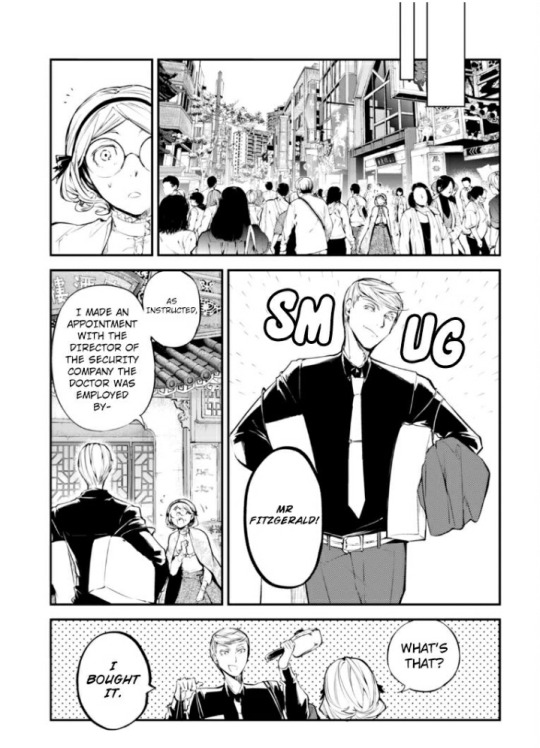
thank u @dazaistabletop for getting me so interested in Fitzgerald's character. ur my favourite Fitz kinnie ok mwah( ˘ ³˘)♥
Francis Scott Key Fitzgerald's novel— The Great Gatsby— was a love story that involved Jay Gatsby, whose mannerisms and characteristics appear to be quite similar to Fitzgerald in the Bungou Stray Dogs adaptation. I just finished reading The Great Gatsby so I thought I'd just make a comparison between the main protagonist of the novel and the main antagonist in BSD's Guild Arc.
Other than the fact that both Jay and Fitzgerald share similar character traits (ambitious, arrogant, and optimistic) the relationships Jay had with the other characters of the novel and the interactions that Fitzgerald had with the other characters of BSD are quite similar, too. I'll focus on three specific associations that both Fitzgerald and Jay experienced in a parallel manner:
Zelda Fitzgerald and Daisy Buchanan
Tom Buchanan
Louisa May Alcott and Nick Carraway
SPOILERS FOR THE GREAT GATSBY!
in case anyone hasn't read it but wants to :)
To avoid confusion, every time I mention Fitzgerald from here on out, I mean the character from BSD; I will specify my references if it comes to the author.
The Great Gatsby had its plot set around the time of the Roaring Twenties: the aftermath of World War I, the peak of socialite culture, and the growth of a prosperous economy and general wealth altogether.
The Roaring Twenties was also a time of luxurious pleasure and liquor, where people indulged themselves and got addicted to hedonism— the pursuit of gratification.
The Great Gatsby was actually written on the basis to prove how corrupt this age was, and the existence of such corruption was vaguely hinted by various factors, one of which included Jay Gatsby's actual source of income: being involved in the affairs of the black market. This proves that illegal activities were not uncommon around that time, as people did anything they could to achieve materialistic gains.
This isn't a history lesson, I promise.
Both Jay Gatsby and Fitzgerald had grown up in poverty and disliked the concept of being anything short of wealthy. They both worked extremely hard to attain financial abundance.
I presume that not everything they did was actually legal when it came to gaining money. As mentioned before, Jay was involved in criminal activities which founded the basis of his wealth, while Fitz once mentioned that in order to own a gun, he had to kill 4 people. He goes on to tell us that he ended up owning that specific gun's manufacturer eventually.
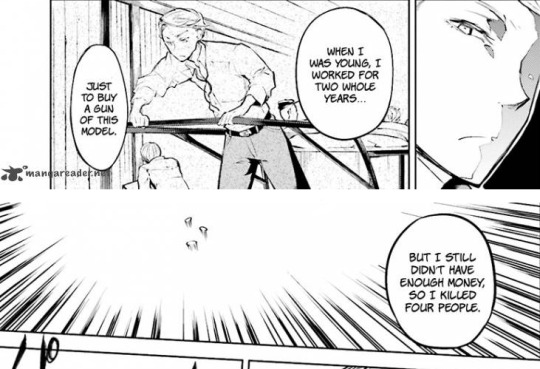
Daisy Buchanan and Zelda Fitzgerald.
The Great Gatsby is actually centered around Jay Gatsby's rather obsessive infatuation with Daisy.
Daisy was a beautiful lady with a incredibly charming nature— she didn't have much trouble with attracting many men back then before she got married to Tom Buchanan, the antagonist of the story and the rival of Jay Gatsby.
"Her voice was full of money," he said suddenly.
That was it. I'd never understood before. It was full of money— that was the inexhaustible chair that rose and fell in it, the jingle of it. the cymbals' song of it... High in a white palace the King's daughter, the golden girl...
Daisy and Jay Gatsby fell in love right before he was sent off to war and a few years before she met Tom. Before they were separated, Jay's dream of gaining wealth and status was primarily flamed by his intention of reaching Daisy's social ranking in order to be worthy of her love.
Initially, because of how passionate he was about his love for her, Jay lied to Daisy about his wealth. It was only after the War did he actually gain the riches he aimed for. By the time he did achieve his monetary goals, Daisy had married Tom already. Consequently, Jay hosted a bunch of lavish parties in order to gain her attention, prove himself and his love for her, and ultimately, win her back.
Jay perceived Daisy as a literal angel, void of any flaw whatsoever. He even tells Nick, the main character, that the fact that numerous men got romantically involved with such a lady just increased her value altogether.
But what gave it an air of breathless intensity was that Daisy lived there— it was as casual a thing to her as his tent out at camp was to him. There was a ripe mystery about it, a hint of bedrooms, of gay and radiant activities taking place through its corridors, and of romances that were not musty and laid away already in lavender but fresh and breathing and redolent of this year's shining motor cars and of dances whose flowers were scarcely withered. It excited him too that many men had already loved Daisy— it increased her value in his eyes. He felt their presence all about the house, pervading the air with the shades and echoes of still vibrant emotions.
As the story unfolded, Daisy's character was torn apart for a proper, more brutally realistic perspective of her true character, revealing a shallow, selfish lady who solely placed her interest in money and luxury, the things which she often took refuge in when things went wrong. As the plot developed itself, the actuality that Jay fell in love with the idea of Daisy, instead of Daisy herself, was much more evident. And it took quite some time for him to discover and acknowledge the truth.
Fitzgerald's love for Zelda was very apparent, too, except that it seemed more genuine and pragmatic. Not much is speculated about Fitz and Zelda's relationship in the Guild Arc, but his love for her was very deep, as everything he did was for her and their deceased daughter.
Side note: Fitzgerald (the author) based Daisy's character partially on Zelda, as both women were brought up in wealthy families and took a general liking to lifestyles revolving around money and ease.
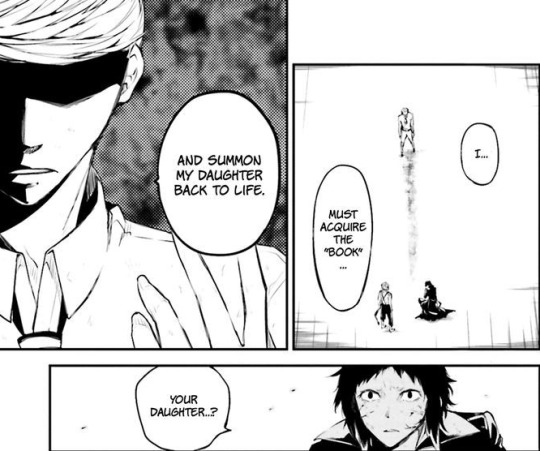

Fitzgerald was in love with Zelda, a woman plagued by a debilitating illness. In The Great Gatsby, Jay was in love with a woman who was plagued by the deceptive addiction of self-satisfaction gained by pleasure and whatnot. Zelda was impaired by an mental illness, while Daisy was intoxicated by the security of money and prestige. This is an abstract suggestion though. Personally, that's how I interpreted this correlation when it came to examining these dynamics in their respective universes.
Tom Buchanan
As mentioned before, Thomas Buchanan was Daisy's husband and Jay's rival who had similar characteristics in matters of personality. The Toms in both book and anime were arrogant and cunning, which pretty much vouches for their selfishness.
In the book, Tom is supposedly the love of Daisy's life, except that she just married him for his money instead of waiting for Gatsby. Then again, Tom was involved in a love affair outside his marriage with a lady named Myrtle Wilson. Tom cheated on Daisy by getting involved with Myrtle. On the other hand, Daisy was unfaithful to Tom by keeping her love and relationship with Jay a secret from him.
The climax of the story partly revolves around Myrtle dying in a hit-and-run car accident. The grand twist was that Daisy was the one driving the car, and the car actually belonged to Gatsby. Because the car belonged to Gatsby, George Wilson, the husband of Myrtle, was bent on revenge and tracked down the car. He ended up killing Jay Gatsby, and soon after that, he killed himself.
It was quite a scandal, but Daisy estranged herself from such a tedious matter. In fact, when Jay died, she did not even attend his funeral. Tom was under the impression that Gatsby was the one who killed his mistress, not Daisy, his wife. Either ways, Nick described them in a way that sums up what became of them after Jay's death:
They were careless people, Tom and Daisy— they smashed up things and creatures and then retreated back into their money or their vast carelessness or whatever it was that kept them together, and let other people clean up the mess they had made...
It's interesting to note that in chapter 45 of the BSD manga, Tom appears as the antagonist who was later found guilty of murdering his employee, but the blame was originally put on T.J Eckleburg, the inventor of the Eyes of God.

Side note: T.J. Eckleburg was actually an optician who appeared on a billboard advertisement in the novel. This billboard was used as a personification by Nick Carraway, which was meant to embody the representation of a displeased overseer who observed the events that unfolded before him. The Eyes of God has a similar concept: scrutinising everything with an accuracy of 97%. It's a personal speculation, but the Eyes of God was proven to be of utmost importance in the Cannibalism Arc when it came to capturing Fyodor Dostoevsky. Likewise, T.J. Eckleburg's eyes showed how corruption and misconduct never escaped his judgmental visage.
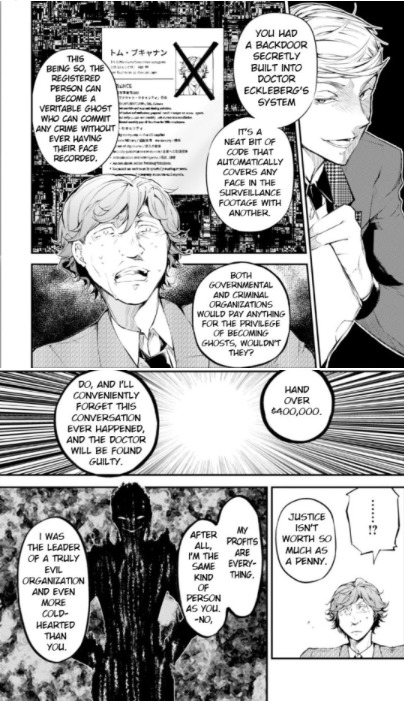
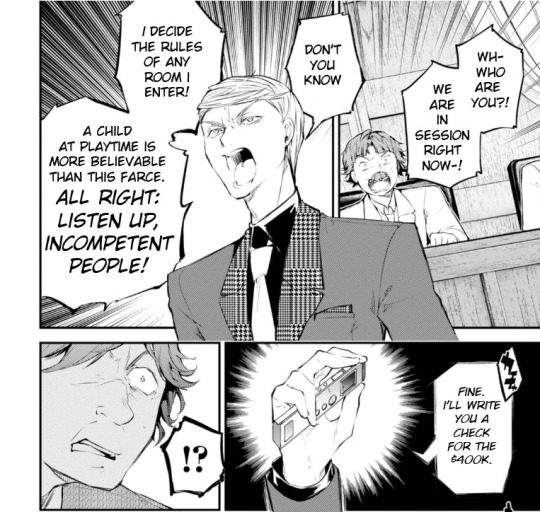
sorry about the quality of the manga panels ;-;
In the manga, Fitzgerald manages to triumph over Tom by betraying his trust altogether in order to obtain the ownership of the Eyes of God and Tom's company. This stands in contrast to what became of Jay in the novel, but the protagonist got what he wanted in this universe.
Keep in mind that Fitzgerald didn't act according to fulfil what justice required; it was purely business. Just like Jay Gatsby put on the facade of a plain, rich man who was really just bootlegging his way to opulence, Fitzgerald wasn't afraid to betray someone's trust to get what he wanted.
Nick Carraway and Louisa May Alcott
If I were to pick a character that represented Louisa May Alcott in BSD from the book, I'd pick the narrator himself: Nick Carraway. Again, this is my personal interpretation, so the association between these two characters is just my personal opinion.
Nick Carraway was known as the more reserved, cynical protagonist compared to Jay. The both of them developed a cordial friendship as the story progressed.
Nick initially took a liking to Gatsby, who was his neighbour. The enigmatic aura Gatsby emitted called for Nick's attention, and in the same way, Gatsby reciprocated his interest in Nick by making the effort to acquaint himself with him.
He had one of those rare smiles with a quality of eternal reassurance in it, that you may come across four or five times in life. It faced, or seemed to face, the whole external world for an instant and then concentrated on you with an irresistible prejudice in your favor. It understood you just as far as you wanted to be understood, believed in you as you would like to believe in yourself.
There were a few times which suggests that Nick didn't like the way Gatsby acted or spoke. Nevertheless, Nick was the only one who stuck with Gatsby until the end.
"They're a rotten crowd," I shouted across the lawn. "You're worth the whole damn bunch put together.
(This was the last thing Nick said to Jay before he died.)
At first, Nick was intrigued by Jay's mystical nature and peculiar idiosyncrasies, but found that Gatsby was a very strange, but 'morally bad' man. However, over time, Nick became one of the few who managed to recognise Gatsby's idealistic ambitions; he saw through all the fame and wealth and found a mere human being capable of being entrapped by love's snares. Basically, he understood Gatsby, despite disagreeing with his actions and even his behaviour at times.
As for Louisa, well, it is a known fact that she was loyal to Fitzgerald because of how much she respected and trusted him.
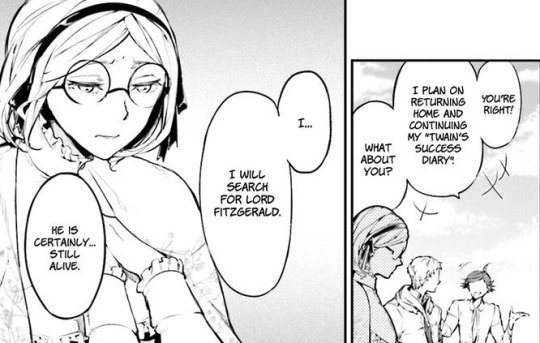

Both Nick and Louisa were intelligent, witty people with generally nice, honest, and reserved dispositions. Their self-contained demeanours make it very easy to get along with the more exurbent/dominant personas of Gatsby and Fitzgerald. So in the event where each pair was isolated from the rest of the world, they had each other to depend on.
Next morning I sent the butler to New York with a letter to Wolfsheim, which asked for information and urged him to come out on the next train. That request seemed superfluous when I wrote it. I was sure he’d start when he saw the newspapers, just as I was sure a there’d be a wire from Daisy before noon – but neither a wire nor Mr. Wolfsheim arrived; no one arrived except more police and photographers and newspaper men. When the butler brought back Wolfsheim’s answer I began to have a feeling of defiance, of scornful solidarity between Gatsby and me against them all.
Such a dynamic created a close bond of trust. Just as Nick was not hesitant to stick by Gatsby's side, Louisa went to great extents just to return Fitzgerald back to his former leading position and work together with him.
Side note: Nick Carraway is suggested to have the INTP personality type, while Louisa is most likely an INFP. Both these personalities are strikingly similar in many ways. They are individualistic in thinking and described as 'seekers' of their place in the world. If you're interested in a more detailed comparison, check this post out
Alright, that's about it for my speculations; I hope they weren't too messy. Thank you so much for reading!
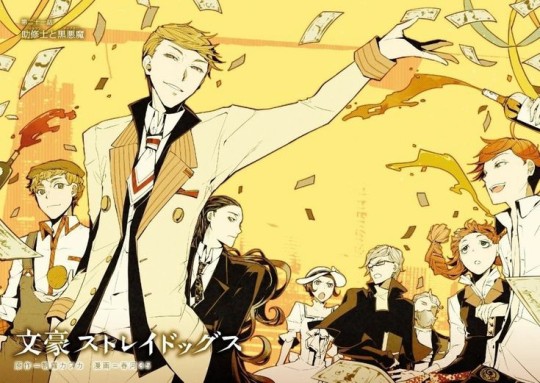
“So we beat on, boats against the current, borne back ceaselessly into the past.”
- Nick Carraway, The Great Gatsby
#bungo stray dogs#bsd#bsd characters#character analysis#bsd analysis#bsd fitzgerald#bsd guild#literature analysis#port mafia#armed detective agency#the guild#bsd louisa may alcott#.ryley.speaks
102 notes
·
View notes
Text
Knight’s and Magic: Final Thoughts
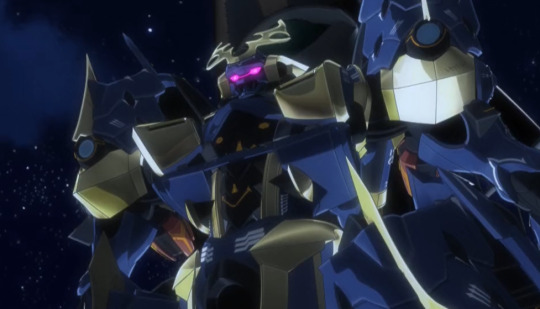
Isekai anime have been very popular in recent years, and 2017′s Knight’s and Magic was one of many cashing in on that trend, with the added twist of being a mecha series. However, what many may not realise is that the Isekai genre of anime was originally born out of the mecha genre, with the first Isekai anime arguably being the 1983 classic Aura Battler Dunbine by Yoshiyuki Tomino. While Isekai has split off and diversified into its own extremely prolific and popular genre, mecha has kept a foothold within it, and subsequently some of the greatest mecha shows have been fantasy-themed, with great titles like Magic Knight Rayearth and The Vision of Escaflowne following in Dunbine’s footsteps over the years, so really Knight’s and Magic should be viewed rather as the continuation of a fairly long tradition of fantasy mecha rather than Isekai but with robots. Adapted from the early volumes of a currently ongoing manga by the same name, it’s a short series, but one with high production values, superb mechanical design and entertaining action. It’s also a series that I ultimately simply cannot stand.
The plot setup is that Tsubasa Kurata is an unassuming but highly talented programmer working in contemporary Japan - or at least he is until he’s killed in a road traffic accident. As he dies, he has but one regret - that he’ll no longer be able to live with his hobby of building plastic model kits of giant anime robots. As is often the case with such a setup, he finds himself reborn into a fantasy kingdom called Fremevilla as the son of nobles called Ernesti Echavalier. However, to his joy, he finds out that the main weapon for fighting back against these monsters is the Silhouette Knight, a kind of gigantic magic-powered mecha. Thus, he devotes himself to the art of learning everything there is about these machines and one day building and piloting one of his very own.
There’s nothing really wrong with this premise, but Knight’s and Magic is flawed in how one-track it is. The show’s really only about one thing - how robots are cool. Of course, I agree that robots are cool. Knight’s and Magic’s lineup of robots in particular is very cool, both in their form and unique functions. However, anyone who’s actually a fan of the mecha genre knows that just having cool robots isn’t enough to carry a show - you have to have compelling characters and interesting narratives. The all-too-frequently trotted-out line of “[x mecha show] is actually good, unlike the rest of the genre, because it focuses on the characters instead of just the robots” is probably the single most effective thing you can say if you want to piss off a mecha fan, because that sentence describes literally every mecha show that was ever worth a damn, even going back to the genre’s roots in the 70s. However, it arguably doesn’t really describe Knight’s and Magic. The series’ creators come off as just as obsessed with robots as its main character, and it comes at the expense of the characters and setting. Each new episode comes with a cool new robot or a cool upgrade for an existing one, but practically none of them feature development of the setting or its characters. Fremevilla and its neighbours never come off as anything more than “generic fantasy kingdom”, the supporting cast are all cut from extremely generic-feeling moulds, and Ernesti never undergoes any growth or exhibits any notable character traits beyond “likes robots.”
Now, there have been several characters in mecha anime who are in large part defined by their dedication to giant robots as an ideal, or simply to their aesthetic, and some of these are truly excellent characters. For instance, Gai Daigoji from Nadesico, Akagi Shunsuke from Dai-Guard, Noa Izumi from Patlabor, Sei Iori from Gundam Build Fighters, or the Super Robot Wars Original character Ryusei Date. The difference between all of these and Ernesti is that being fans of robots isn’t the only thing that makes them relatable or endearing characters, whereas in Ernesti’s case it’s basically the only thing that defines his personality. It also doesn’t help that he’s perhaps the biggest Mary Sue main character that I’ve seen in a mecha anime. His gimmick is that his past-life experience as a programmer also makes him profoundly adept at magic, and that he’s a genius Silhouette Knight designer. He’s always totally successful at everything he tries and everyone loves and respects him for his accomplishments. Ironically, it’s this that makes him an unlikable character for the viewer, because, again, he has no real admirable qualities beyond liking robots and being good at making and using them. It’s a character’s struggles and tribulations that ultimately make them truly sympathetic, and Ernesti is never really challenged until right at the very end of the series, and ultimately that challenge only feels like a mild speed bump for him. This results in a series that despite all its cool robots and flashy battles is fundamentally dead as a story at its core.
However, all of this simply describes a series that I would find boring and mediocre rather than one I actively disliked in a serious way. However, this is arguably the first series I’ve watched since Gundam Seed Destiny that really ground my gears quite badly, and it all boils down to one specific moment in the show’s narrative. To explain why, I need to diverge from my usual review format and spoil not only this show, but also it’s forefather, the original mecha Isekai, Aura Battler Dunbine. I really don’t think spoilers for the former is anything to worry about but spoiling the latter is probably more of an offense. As such, the remainder of this review is below this spoiler cut:
Dunbine is not everyone’s cut of tea. It’s old, has bad animation, it’s long-winded and has a sometimes confused and scrambled narrative in accordance with some of Tomino’s worst habits. However, it was also a work of great imagination that really delivered on communicating a valuable message in some engaging ways. It’s a message that Knight’s and Magic cheerfully and infuriatingly tramples all over. Let me explain.
In Knight’s and Magic, the show’s hero is an outsider who enters into a fantasy world and uses his real-world knowledge to bring about a revolution in technology. This also happens to be the chief descriptor for a major character in Dunbine too.
However, this isn’t the description of the show’s protagonist, Show Zama.
It’s the description of the show’s villain, Shot Weapon.
Shot Weapon is the creator of the Aura Convertor, the technology that powers the show’s mecha, the Aura Battlers, and other weapons besides. The introduction of this technology destroys the peace of Dunbine’s world, Byston Well, and causes it to descend into anarchy and bloodshed. However, the real devastation doesn’t occur until Shot’s creations are transported back into our world, where they inflict destruction almost beyond imagining. Ultimately, Shot Weapon’s actions condemn him to a punishment of being forced to live forever in Byston Well in a state of eternal suffering, like Cain after murdering his brother Abel. Dunbine’s ultimate, most crucial message is that those who manufacture weapons and spread death are to be condemned.
Knight’s and Magic gave itself the exact same opportunity to deal with this exact same theme. The show’s final arc is that a kingdom called Zaloudek has accumulated vast military power and used it to invade its neighours. We get to see as they descend into a neighbouring kingdom, slaughter its just and rightful rulers and install themselves as tyrants. Now, enter Ernesti and his friends at the conquered kingdom’s borders. At this point he’s achieved his aim of creating his own unique robot called the Ikaruga, and in its first battle effortlessly dispatches the Zaloudek soldiers guarding the border. In the aftermath, he examines the wreckage of a destroyed Zaloudek Silhouette Knight. He and everyone else see the obvious - this machine, the Tyranto is based on Ernesti’s designs. Previously, one of the prototype Knights he’d constructed in an earlier arc was stolen by a mysterious foreign agent, and now it’s become clear what happened to it. The source of the military strength that’s fuelling Zaloudek’s ambitions of conquest are the new technologies that he created, reverse engineered from the stolen mecha. As he looks upon the wreck of the Tyranto, the show is presented with a unique opportunity to do something that it’s thus far not done - challenge its protagonist with the consequences of his actions. Sure, Ernesti is not exactly the same as Shot Weapon - he only wanted to create robots because he thought they were cool, while Shot Weapon wanted power. However, in this case the end result has been the same - death, destruction and oppression. Ernesti has a chance to think about whether the things he’s done are right and acknowledge that he’s at least somewhat responsible for the disaster that’s played out, even if it’s just to acknowledge that he has a duty to set things right by beating Zaloudek. This is an opportunity for him to grow as a character for the first time.
The show swerves this opportunity without flinching.
Sure, Ernesti does liberate the kingdom in the end, but it’s clear that it’s not as a result of any real moral calling. He just wanted to build more robots and fight with them. His motivation in the final battle is that he wants to destroy the enemy’s flying battleship because he’s worried that battleships might replace Silhouette Knights if he doesn’t. He remains a totally one-dimensional character right to the end.
As I said before, Ernesti’s obsession with cool robots arguably mirrors that of the creators of this show, if its myopic focus on them is anything to go by. Perhaps this seems extremely out of character for me to say, but this is an infantile obsession. Yes, I like giant robots, but I don’t like them so much that I miss the point. The core of not only the real robot genre that both Knight’s and Magic and Aura Battle Dunbine belong to despite the fantasy trappings of the show, but arguably of the mecha genre as a whole, is that technology can be a force of destruction and great evil when not used responsibly. Yes, the protagonist mecha in these shows are meant to be heroic, but only in their opposition to those who’d use technology as a tool of death and oppression. This is the core of the soul that makes mecha as a genre compelling. It’s a point that Knight’s and Magic completely misses and why it’s fundamentally a failure. It’s as if it’s trying to be what the mecha genre’s detractors try to paint it as.
That said, despite my misgivings there is entertainment to be found if you only want dumb action. But I’d highly encourage you to check out any alternative. If you want a fantasy mecha series, Dunbine, Escaflowne and Rayearth are all much more compelling stories than this - even ones I’m not so keen on like Panzer World Galient and Ryu Knight are fundamentally more interesting as stories than this. If you want a story with a mecha fanatic in the lead role, you’re much better off watching Patlabor or the chronically underrated Dai-Guard instead.
23 notes
·
View notes
Text

CHUCKY (SEASON 1) REVIEW
Didn't think much on the Chucky TV series when it was first announced. But, I have to admit that I enjoyed the first season. Set some time after the events of Cult of Chucky, we find ourselves in Chucky's hometown Hackensack, New Jersey. Here, we follow the life of teenage Jake Wheeler who was making a doll-themed sculpture and happens to buy a Good Guy doll...but soon strange things start happening with the doll and the body count rises.
To start with: the characters. Jake was a pretty good lead: we have him being the "unfavorite" of the family in large part because he was gay, not helped by the fact that he had an abusive, alcoholic dad. I liked how they made Jake come across as a foil to Chucky himself: Chucky had an idyllic life with loving parents but chose his darker impulses, whereas Jake stays true to himself. While I did like the character, can't help but wish we got a little more of "dark Jake" because I started the series thinking that he would be Chucky's little lackey boy.
Next is Devon. He has his own amateurish true-crime podcast and is Jake's love interest. While I can appreciate the positive representation in the show, it wasn't at least until the middle mark that I bought into their relationship. Like Devon did slowly take an interest in Jake's life and offer him to join one of his episodes centered around bullying. But beyond that, didn't really get that whole sense they would eventually take the relationship to the next level. This was a little rushed to my liking, but you can argue that the development was there when Chucky gets into the equation.
Our third protagonist is Lexy, a character who took me on a joyride. Originally, I just hated her because she harassed Jake for no real reason and is just a nasty, toxic person in general to where even her parents didn't appear to like her, or let alone love her. That isn't even getting into that disgusting stunt she pulled at the Halloween party.
I was so pumped to see this girl get murked by either Chucky or Jake, and there were two significant times where it seemed we would be rid of her, but they were teasing us.
We do have her eventually develop as a character...but I got the impression they were doing a speed run. I get that she would slowly start to change after her run-in with Chucky, but the redemption wasn't "earned" IMO. Like how she goes to call Jake and Devon family which I understand the intent, I didn't completely get behind because sure they were "fire-forged friends" because they had to come together to take the killer doll down, but going so far as to call them "family?"
I appreciate the series' intent with Lexy, but they did a complete 180 with her character.
Lastly, there is Junior, Jake's cousin. He comes off as especially toxic towards his cousin when circumstances forced him to live with him due to Jake being gay. At the least, he did show disgust with Lexy's stunt at the Halloween party. Like Jake, he has his own stint at being darker, and understandably so because tragedy after tragedy befell his family so he would go off the deep end eventually.
With those kids accounted for, the main attraction is, of course, Chucky. As always, Chucky is the bomb. He cracks more jokes here that hit, but it also takes time to show that he can be manipulative as a corrupting influence and even charismatic whenever he tries to get any of the kids to kill.
And speaking of the killer doll, I loved how we were given his backstory. Sure, they are not complete flashbacks that go over everything that has to do with his childhood, but it focuses on the more prominent, defining moments that made him into the Lakeshore Strangler he is now (also glad that they acknowledged the fact that he was nicknamed that when he never really tries to strangle his victims in the other movies). I loved how some of the flashbacks appeared to be grainy like footage you'd see with an 8mm camera. The found-footage style just accentuated the creepiness.
How are the kills? They are amazing in the show, well maybe aside from the first one due to it being goofier in a way. My favorite one would be the knives in the dishwasher because of the simplicity to it. The practical effects with maneuvering the Chucky doll were also good. And like a true horror fan, Mancini employs a lot of references to different horror films but it'd take forever to list them all.
Lastly, I liked all the references that are made to other movies in the franchise. My favorite one has to be Jake having to check if his Good Guy Doll had batteries and later, holding Chucky up, demands that he talk to him to which Chucky gives him a good slap.
The only negative I can really think of is the finale. It was underwhelming because of the loose ends and unresolved conflicts. Had it not have been announced that we'd be getting another season, it would be a weak way to end the show.
But I enjoyed the first season and am looking forward to season 2 next year.
Story: 7.5/10
Characters: 6.5/10
Horror: 8/10
Sound: 7/10
Overall: 7.25/10
11 notes
·
View notes
Note
hi. i am sending this on anon because i want to talk and not to bring anon hate on myself immediately. i am literally from the other side of the fandom, i have no idea how your post ended up on my dash. but i am literally curious, so i want to ask you a couple of questions, you obviously don't have to answer at all, your choice. 1/
"they complain about misogyny and then go and refer to Sam’s wife as a walking uterus." isn't it an issue though? she is never introduced, we aren't even shown her face. this is a new character in a 15 year old show, introduced only for the purpose of being The Mother to the protagonist child. what they did is misogynistic enough, she has no name, no face - us laughing about it is not misogynistic because we are laughing about what they did which is insane. that is how i see it. they introduce2/
"Pay attention when Dean blatantly says “I don’t swing that way,”" and the rest of what you said in that paragraph ok i know i am on anon but are you. are you sure that when someone says this. this is always true. i know numerous peoplei, i am one of those people myself who were in such denial and told so many lies about themselves when it comes to sexuality and sorry but Dean makes an impression of some who would be in denial about many things but okay this is in headcanon territory 4/
this is in headcanon territory and everyone can have their own headcanon so why do you have such problem with people headcanoning him as bi "And besides that... the way they portray Dean in fics? They feminize the everliving fuck out of him, to the point that the character they’re writing isn’t even Dean. Like, in any way, shape, or form. "this is one of the things i can actually 100% agree with because Dean in fics is often feminized yes, it is usually ooc, yes, though if we are talking 5/
okay :* i know i didn't click anon on one of them because i am not used to sending anons but i did explain why i wanted them on anon in the first place - i have enough anon hate on the daily basis. i am counting on you to answer me or just leave it but still i think my asks weren't hateful. i am genuinely curious. and how did they ended up on my dash is a mystery for both of us
So, tumblr ate at least TWO of your asks, which tumblr does if you send too many sometimes. I’m just curious why it gave you a character limit? Tumblr lets me post long asks now and separate them by paragraphs, lol. But anyway. Ask number 3 and whatever is after ask number 5 is missing. But I’ll go with what I’ve got.
The one marked as number 5 is the one that bothered me first because I actually covered it in my post to which you’re referring.
Your question: this is in headcanon territory and everyone can have their own headcanon so why do you have such problem with people headcanoning him as bi
What my post said, a direct quote so you don’t think I’m cursing at you specifically: Like, whatever, you can headcanon a character whatever way you want. Write them however the fuck you want in fanfiction. But for the love of god, respect the actual fucking canon.
My point was Dean is straight in canon and people should respect that instead of forcing their headcanons down everyone’s throats. I headcanon Sam as demisexual. But is he in the show? No, he’s canonically straight. Does that sway my headcanons and keep me from enjoying the show the way I want? No. Do I shout that to anyone that will listen and try to get them to share my beliefs? No. That is the difference between canon and headcanon, and respectful fans and disrespectful fans. Too many people refuse to acknowledge that Dean is canonically straight because of the color of a flannel he wore, or strobe lights he’s standing in front of a bar, or the fact that a diner was out of pie and he had to eat a slice of cake instead. I am not kidding, those are reasons people have considered him bi. That is harmful to actual bisexual people like myself.
Now, in response to ask number 4: Dean is comfortable in his sexuality. If he was bi and was closeted, or hating himself for being bi, or in denial about it, do you think he would be so comfortable around gay people? He would most likely be repressing his sexuality so hard that he would come off as standoffish or lashing out at gay people because they are what he dislikes about himself. He wouldn’t be as comfortable as he was with the gay characters he did spend time with. He’s not hiding anything. He’s completely open. His dating profile says Interested In: Women, not Men and Women. If they wanted Dean to be bi, or give a nod to it, they would have said it in that tiny scene. Supernatural hasn’t queerbaited anyone, so the majority of the audience didn’t even see a possibility for Dean to be bisexual, because there wasn’t any subtext for it.
Ask number 2 (I don’t know why I’m going backwards, I’m a whole mess):
While I didn’t think the blurry wife was the best idea, I liked that Jared said that the intention was for Sam’s partner to be whoever we want them to be. They left it open because it wasn’t about Sam starting a family without Dean; it was about Sam’s half-life after he lost his most important person, and the buildup to when they would finally meet again. So they left the blurry person open to interpretation, just that they were not Eileen. You can laugh about it all you want, but calling the person a walking uterus is disgusting as fuck. Supernatural as a whole has been a pretty misogynistic show sometimes, not just to women, but to Sam who they have woman-coded throughout the show. So.
That’s my take. I hope I was respectful enough for you. Like I said, I don’t care what you headcanon, but when a character, the actor, and the creators specifically state that the character is straight, I suggest you pay attention to that. Don’t let it ruin your experience or your headcanons because that ruins all the fun, but also don’t disrespect the writers by denying what they have stated.
Have a nice night.
38 notes
·
View notes
Note
Hi! I just read your rant about how Duggan uses and sees feminism. His book is nothing of that. To me, it uses fantaisies of white men and makes it believe it's feminist. His feminism is very lazy, it's like he read twitter and hop he put it in his book. Actually, if i have to call it feminism, i would say it's white feminism and nothing else. His book isn't inclusive, it's just about Emma and Kate doing badass stuff. Now, it's easy to say productions, writers and tv shows use the feminism to sell their creations. To me, it's the case for Duggan. It's clear he doesn't understand a bit of what the feminism is. It's not just being badass or using the me too movement. No it's far than that. It's a fight for equality and for men to acknowledge, we the women, are also human being and have the right to be respected and to have the same rights and duties than them.
I'm sorry to say it but duggan is far far of being a feminist. He used Emma in particulary as one of his strong female character fantasy. She is always sexy, she knows everything, she is always strong. To me, his version of Emma is badass and great but something is missing in her. She is just badass. So since he creates his fantasy of strong females characters, it's logic he is dismissing the men of the show. Look at who they are. They are all traits who can make us think the book is inclusive, all suffered from the humans, iceman is gay but he does nothing with them because he sees no interest in them. They are just here to tell us how amazing the strong females characters are. If you want my opinion (which you don't sorry), Duggan is very insecured with the way he writes Emma and Kitty who are very basic. His writing is just here to tell "yo look i understand you, i am a feminist, i can't be sexist see". If he starts to give a proper writing to the others characters, we will start to see that his writing of his fantaisies aren't that great.
But again it's an opinion. It's just to sell his book.
Hey, I very much appreciate your detailed opinion!
I think we're also talking about the difference between Strong Female Character and actual strong female characters. Writers and film-makers have interpreted the desire for strong female characters as "more sexy, badass women" (and of course, they must always be sexy), when what many of us female readers/audience members really want is women who are complex, flawed, interesting, and allowed to be an important part of the narrative, just like male protagonists. It's nice to see strong, badass women - I admit, after the MCU being so male-centered for so long, I really loved seeing Captain Marvel being incredibly powerful in her own movie. But having a woman be a badass isn't the same as having her be an actual good character, and many movies will have the Strong Female Character who kicks ass then winds up playing second fiddle to the male protagonist, for whom she is also, of course, a love interest. A female character doesn't have to be a badass or physically strong to be a strong character, she just needs to be complex and fully realized.
I think Duggan is trying to give us strong female characters by making the women front and center, but he's really giving us Strong Female Characters by making Emma and Kate virtually flawless, which is really a disservice to both of them. Emma in particular is interesting because she is so complex, and capable of both great evil and great good, so watching her strut around being right all the time really flattens her character. (And it's kinda boring - I don't want to watch Sebastian lose to Emma yet again, I've been watching that for most of this series.) And he is also pushing a white, wealthy, model-beautiful woman into the spotlight, and down-playing Storm, the WOC on the team. And if you want to talk representation, the men who are being mostly ignored or used as window dressing in the series are: 2 POC (Bishop and Shinobi), 3 LGBTQ guys (Iceman, Christian and Shinobi). Not to mention Sebastian himself, who basically admitted to being bisexual in Hickman's X-Men, but that is being ignored. Pyro is the only supposedly cis, white, "straight" guy, and even he is arguably being "straight-washed" given that he was originally queer-coded back in the day.
I think the treatment of the guys has underlying layers of toxic masculinity, since they are so rarely allowed to to express complex emotions and are just expected to make witty quips or get angry. (Especially Bishop, Iceman and Pyro.) Not that I necessarily want to see "sad boy Pyro" breaking down in tears, but at least that might feel like serious character development for him. We don't get to see Bobby's grief over Kate's death, just his anger, and his relationship development with Christian is virtually nonexistent. We still haven't dug deep into Shinobi's relationship with Sebastian, and his "I still want to kill my father" is treated like a joke. (Admittedly, it's a funny line, and very in character for Shinobi.) The only guys who get to have "tender" moments are brief guest stars, like Masque, Forge and his human friend, and Jumbo Carnation. Which makes it extra frustrating, because Duggan clearly CAN write good, emotional character moments, but for some reason he can't be bothered to do so for much of the male cast of the book.
Damn, my Marauders critique really has gone far in the direction of "But what about the poor meeeeeen?" Maybe I'd feel differently if the two stars of the book were more obscure female characters, instead of two well-established and iconic X-Women. Like, I don't mind that Kwannon is clearly one of the stars of Hellions, because she is desperately in need of her own development and storylines as a character, and because Wells has managed to balance his writing to give all the cast something to do, rather than just dropping certain characters for months at a time.
5 notes
·
View notes
Text
here is a post of Why I Like Nanamaru Sanbatsu which may or may not also be a Reasons Why You Should Watch Nanamaru Sanbatsu but it’s not made with the intent of persuasion and more of me just gushing over things because this isn’t spoiler friendly
1) Niche Sport
I’m not a stranger to “Sport but it doesn’t involve Ball or Sweat”. That’s a lie, the players sweat a lot in Chihayafuru. The fact that Sasaijma (and then another character in the later chapters in the manga) refer to Karuta is a reason enough to pick up the series. Hikaru no Go was one of my earlier sports anime as well. It’s not like I was a fan of Go or Karuta either but the way the characters wholeheartedly loved what they were doing (and competitively), it made me love it as well. The same definitely goes for Quiz Bowl. While the two I listed were something I completely had no clue how the rules go, Quiz Bowl is a bit more obvious so it’s easier to get into.

(kinda hate these promo pics because there looks like so many fcking charas but really you just need to remember like 5 of them)
2) Nerdy Protag in a Sports anime
Actually coming from YowaPeda, Crunchyroll recommended this amongst other things. YowaPeda did the trope a lot better, given that you’d never associate an Otaku with Biking while a Bookworm being associated with Quiz Bowl does not seem unheard of. But the idea of a nerdy protagonist in a competitive sport was still an allure.
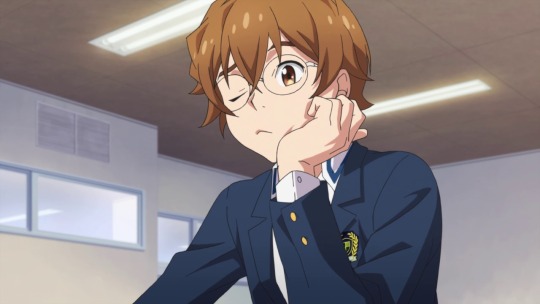
And oops, I think Koshiyama is a cutie so there’s a huge bias towards that. The fact that Horie Shun who voices Enta Jinnai from Sarazanmai voices Koshiyama Shiki gave me a laugh and he actually fits his role very well. Further emphasizes his cuteness without Enta’s weird gay crush lol
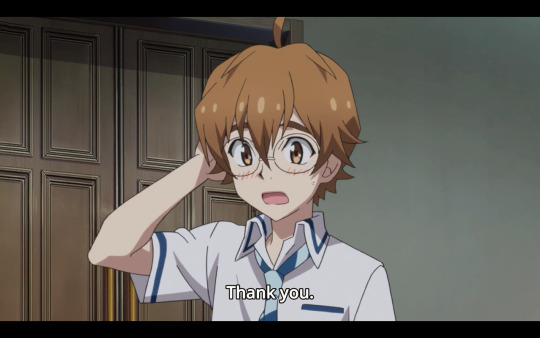
3) Ishikawa Kaito
I’m not above watching anime for seiyuu reasons alone but I actually went in blind with this series and to my surprise one of my favs was in it. I’d known Kaito mostly for Kageyama Tobio first, but he’s gone through so many other roles that I enjoy (Kaki from Pokemon SM, Iida from BokuHero, Mimura Subaru from 2.43) and I’ve watched a lot of seiyuu events/radios with him so I’m just a big fan of him in general. Dunno if I should have just merged this point with the next but-
4) Mikuriya Chisato
Kaito has The Range and can do whatever role he wants (I’m most impressed by his role as Alan from BNA) but I think I have a weakness for when he’s slightly an asshole. Mikuriya gave off the generic rival trope, which he kind of is. I got some Subaru vibes from him as well. I don’t know if he’s canonically handsome, but yes I think he’s very good looking for an anime character. Plus the fact that he’s The Cool Guy but is participating in such a sport as Quiz Bowl. AND the moe gap that is his feminine sounding first name and the possibility that he might also actually be an otaku is 👌👌👌👌

My friend had tagged something with him as “Chazz Princeton with a haircut” and while Not Entirely, he is the “We are not friends, we are rivals but I interact and help you enough that we are practically friends but i will continue to deny it” and I love that trope. The way he’s so not interested in Gorls or Nonsense reminds me of Manga Manjoume, though nowhere as serious because he is not above nonsense himself.

5) Fukami Mari
The moment she was introduced, I had very low expectations for her. Of course she is the one that drags Koshiyama into the Quiz Bowl world BUT she doesn’t fall into the trope of “Female is very good at The Thing, BUT Newbie Male MC does it better than her almost immediately”. I’m so glad for that because as you go on with the series, she is very much an entire character and not just a female support cast.

She loves Quiz Bowl but she’s not the best or even very good at it. Her childhood friend from another school (which I was 75% betting that it was going to be a male and a potential love interest) turned out to be a female friend. Instead of “cat fight”, they are still very amicable towards each other and support each other but also acknowledge each other as rivals. The fact that Yuki had only started Quiz Bowl because of Mari but liked it enough to continue on by herself, I think that’s really great.
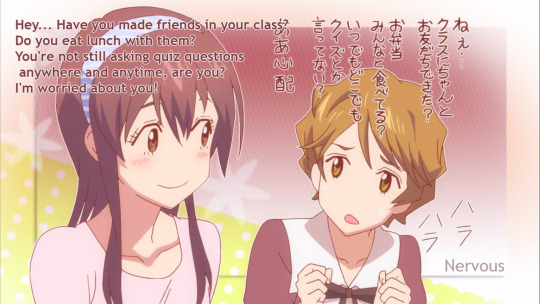
The anime doesn’t get to it, but she confronts her brother about why he quit Quiz Bowl and challenges him. She has her own goals and ambitions and you see her working on it. She also has her strengths and weaknesses and is a vital addition to the Buzou Quiz Team. Fukami Mari is A Good Girl and I won’t tolerate any slander towards her. The way the beginning of the series sexuallizes her via putting her and Koshiyama into generic anime situations is so uncomfortable but I’m glad they move past that later.

Also since their group isn’t technically a Club (?) Mari isn’t just Female Manager. A plus to Quiz Bowl being Co-Ed sport.
6) Quiz Questions
I like trivia. It’s a little harder to guess the questions along with the anime because you’d have to pause all the time and half the time the contestants are going to buzz in early before you hear the entire question. Unfortunately, unless you actually are a fan of random knowledge or a huge nerd, the questions might actually be hard as well. I literally only knew about 3 questions asked in the entire series and its the anime/manga related ones lol. Still, I enjoyed seeing the characters draw their conclusions and to know what each character’s strong and weak points were. (Mikuriya using Math to calculate the Day of the Week from the past was 😚👌)
7) Side Characters
The first one I’m thinking is obviously Sonohara Akira. The moment of his first appearance, I had a hunch that it wasn’t exactly as it looked. He’s a little schemer but he has his own code of ethics, so he’s not all that bad. (Also hes A Gamer, so Relatable.) The fact that he’s related to Sonohara of Asagaoka makes it all the more interesting because they're’ so different. The way everyone reacts to him is so interesting because he doesn’t take it seriously while everyone else does. My favorite interactions with him aside from the Akiba Squad are the ones with Ookura. (I actually prefer to ship them over Niina/Akira lol)
Sasajima, mysterious Quiz Master with a past related to Fukami’s brother, who used to go to the Prestigious Quiz King School. Character wise, he doesn’t seem interesting but I love his idea of what a Quiz Bowl should be. My favorite parts of a series is when they love the thing they do, and that having fun is what is the most important. Of course you have to be fairly good at the thing first to be able to enjoy yourself freely but he never brags and is a supportive senpai.
Jinko. She’s cute. That’s good enough for me lol. I guess her Electronics Thing is also pretty cool. I like seeing the Sasajimas interact.
8) Ship
Okay, well, its obvious where I fall here. I don’t remember the last time I’ve watched such a generic sport series with a one on one protag vs rival. I’m not above shipping the “obvious/main” ship, as SasuNaru and Edgewright are some of my ships. However I didn’t ship Akira/Hikaru and I don’t ship KageHina but I do ship something like Manjoume/Judai and if asked MakoHaru vs RinHaru, I’d pick the latter, so it might just be a matter of tastes and I won’t fall immediately into every “rival” ship.
So why would I ship Mikuriya/Koshiyama? Because I love it when the Cool Guy falls for the Nerd and EXTRA POINTS if the Cool Guy is also secretly a nerd too. When I mean secretly a nerd, I don’t mean Mikuriya being on quiz bowl but that he might be a closet Otaku. (ImaSaka is everything about this trope.)
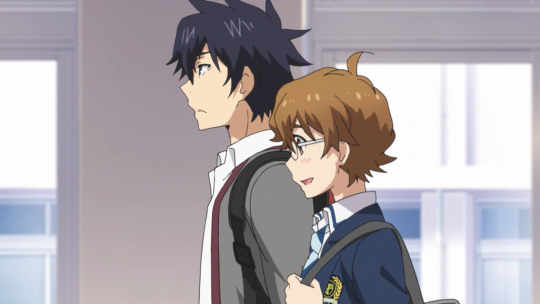
Anyway, they are the main two rivals in the series, so of course they acknowledge each other. Koshiyama took it so dramatically but in the past, nobody cared about his presence, let alone think that he’s a Threat. Mikuriya is a Hot Shot and thinks he’s better than everyone but this newb with potential beat him one time (unofficially) so he’s automatically curious.
Even though it is Hot Blooded Competition, Mikuriya always seems to encourage and cheer Koshiyama on (in his own rival-y way of course) whenever he feels down about not being strong enough to compete with him. (When they were lining up for the Third round at Asagaoka) Even when Koshiyama lost, after Mikuriya had a huge handicap, Mikuriya tells him he’ll take him on anytime. The fact that he wants to do Quiz Bowl with (against) him, is practically Sports Anime confession. “I won’t wait for you, Git Gud” “Okay I will Git Gud so we can fight again” *Fist Bump* What are you guys doing.

It might just be the art style but there is a copious amount of blushing happening every time the two interact. Also that height difference!! Mikuriya is 172 while Koshiyama is 153, I fucking love it.
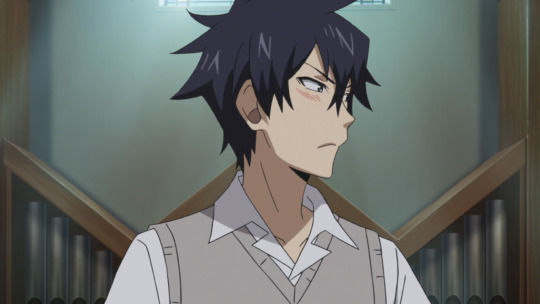
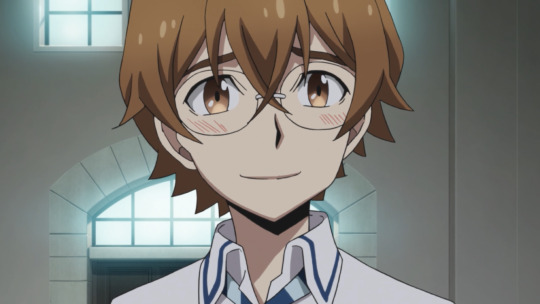
Uhhhh that’s about it. I would like to gush more but there’s only a few chapters of the manga that’s been fan translated and it’s not even half of what’s actually out there. (I think the manga is complete by now?) There’s only one anime season of the series, and I doubt there’s going to be more so RIP me.
#pixi post#nanamaru sanbatsu#7o3x#7o3x fastest finger first#nana maru san batsu#theres no point in tagging it because people who are in the tag have already seen it#long post#in case mobile wont add the read more
7 notes
·
View notes
Text
Chapter 5 – Hey, Soul Sister: Who is Eurus?
Do you get it? She’s his sister? But metaphorically, she’s a part of his soul? I was very impressed with myself for this title. Anyway…
This chapter of the meta is going to deal with the various times we meet Eurus before TFP and what this might mean, which will help us to understand who she is once we have stripped off the disguises.
Before series 4, we had real!characters and MP!characters set up as distinct entities, particularly in TSoT, which distinguishes between MP!Mycroft (the deducing brain) and real!Mycroft, as well as MP!Irene representing desire and real!Irene, who doesn’t come near the episode. The MP section in TSoT, for a lot of people in the fandom, broke down Sherlock’s psyche into MP!John vs. MP!Mycroft – and John is clearly winning.
However, I want to suggest that Sherlock’s psyche isn’t nearly so straightforward as a tug of war between the brain and the heart. Whilst MP!Mycroft undoubtedly represents the oppressively reasonable part of Sherlock’s psyche, that’s not the only thing repressing him – it can’t be. If it were simply a rejection of ‘sentiment’, this wouldn’t be the powerful queer love story we know it to be – there is a lot more internalised homophobia being dealt with than just love being illogical. That’s where Eurus comes in.
Eurus and Mycroft are parallel oppressive forces in Sherlock’s brain, but they’re oppressive in different ways. Having family members and childhood trauma be the psyche’s symbols for repression is particularly poignant in a queer love story, for obvious reasons. However, I want to take you through my reasoning behind Eurus being the most secret and troubled part of Sherlock’s soul.
The first clue is that her prison is called Sherrinford. We all assumed that the third Holmes sibling was going to be Sherrinford back before s4, and it seemed that way in the beginning, with Mycroft mentioning speaking to Sherrinford several times, construing it as a person rather than a place. This is no coincidence – for those who aren’t familiar with the history of the stories, Conan Doyle’s original name for his protagonist was Sherrinford Holmes, which he later changed to Sherlock. That Eurus is trapped inside Sherrinford is a clear suggestion that Eurus is something that’s trapped inside Sherlock – a dangerous MP entity. More important than that, Sherrinford is the version of Holmes that never made it into the books. Plenty of people have worked on queering the Holmes canon and working out what ACD might have been implying and leaving out and arguably none more so in an adaptation that Mofftiss. Let’s think about the implications of this. A kind of second self, not shown to the public, buried inside your mind and forgotten since childhood, which is bursting out into a moment of acute psychological distress. Gee, I don’t know what that could be about. The Sherlock that Sherlock thinks he is has thus far been dominated by MP!Mycroft, but this series is about uniting canon!Holmes with the non-canon, queer Sherrinford who has always existed, judging by the name, and who is currently dominated by the destructive MP!Eurus. The other important point to note here is that Sherrinford is an island in the middle of the sea – that’s not a coincidence, given how much water imagery abounds in this series. I spoke briefly in Chapter 2 X about how water represents Sherlock sinking deeper and deeper into his own subconsciousness – this is the deepest he can go. In Greek mythology, Eurus was the name of the wind most associated with causing storms at sea X – this isn’t a coincidence either. She’s very deliberately tied in with water.
(In real life terms, of course, all this means that a real!Eurus probably does or did exist in some form, although I can’t begin to hazard a guess about this. However, I’m trying to refer to her as MP!Eurus when she’s in her normal form in the MP, in case we get a series 5 with Sian Brooke as real!Eurus, and also to distinguish her from therapist!Eurus etc.)
This is my reasoning as to why MP!Eurus represents Sherlock’s innermost trauma. She is not merely the fact that he loves John – he deduced this in TSoT without her appearance. She is the trauma that he needs to come to terms with. A running theme through our analysis of Eurus will be that her gender is particularly important; her representation of Sherlock’s repression cannot be but as a woman, because for most of s4 he is only able to process his identity through the most heterosexual of lenses. We see this hinted at quite early on in TST, when Sherlock takes on a case called ‘The Duplicate Man’, warning John that it is never twins. The word ‘duplicate’ here, removing twins, leaves us with the only real possibility that it is in fact the same person. Eurus’s gender makes that more difficult to see; she needs to be female, but it’s much more difficult to elide the two characters without employing a Cumberbatch doppelganger. However, this hint that Eurus is not only male but an actual ‘duplicate’ of her brother should give us pause for thought. With this in mind, I want to use the rest of this chapter to analyse her three forms before TFP.
1.) Faith!Eurus

I’m certainly not the first to point out that Faith!Eurus is a mirror for John, nor will I be the last – people jumped on it pretty much as soon as TLD aired. There are a few good reasons for this. Firstly, she walks with a cane, a throwback to ASiP – in case we’d forgotten, however, Sherlock has a flashback to John walking with a cane to make the link explicit. We are supposed to link these two characters, the authors are saying pretty clearly. Faith!Eurus is also suicidal, which John was at the start of ASiP, as made clear by the fact he carried a gun – and Faith!Eurus does the same. Sherlock also takes her out for food (for more on the food/sex metaphor, see here X) which he doesn’t with anyone bar John, and we certainly never see him talk so easily with someone who isn’t John. An eagle-eyed tumblr post that I can’t find now also broke my heart in pointing out that Faith!Eurus’s unseen self-harm matches long-sleeved John Watson a little too well.
This isn’t just the show trying to remind us of what John was like in ASiP, however. MP!Eurus is the trauma prodding Sherlock’s sexuality – it’s going to be hell to get through it, but he absolutely needs to do it. This is Sherlock’s trauma, not reminding him that John was suicidal, but forcing him to acknowledge it in the first place, something which Sherlock has buried. We know this because of the way the image of John forces its way into Sherlock’s mind – it’s much like the way Moriarty breaks into TAB. His brain is making a connection that he’s not quite capable of making and it’s knocking him. His deduction that Faith!Eurus is suicidal is accompanied by that image of John, and he then re-enacts the food ritual he completed with John the evening John left his cane behind, before throwing Faith!Eurus’s gun into the Thames – proving that it was Sherlock himself who stopped John from taking his own life.
This is trauma, however, and Sherlock can’t process it in full – hence why the image of John that breaks in is shaky, and Sherlock tries to push it out of his head. It’s also why Faith!Eurus, who in Sherlock’s subconscious could take any form, specifically takes the form of a woman. His gay trauma means that he first has to process John’s suicidal ideation in a heterosexual dynamic, before fully grasping and applying it to his relationship with John. (Chapter 9 X explains how that plays out over the rest of TLD in full detail.)
2.) E!Eurus
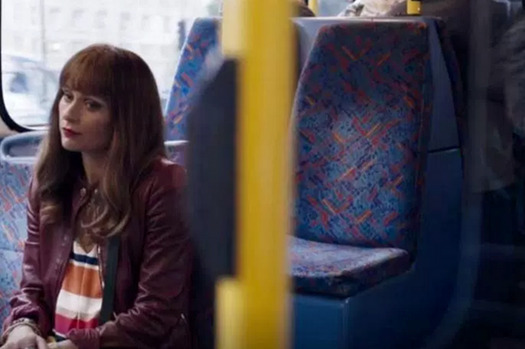
Taking a jump back to surface level plot here, the first thing that grabbed me about E!Eurus was just how minor John’s flirtation with her was. In the terms of a television show which really rides on very high drama (multiple faked deaths and insane cliffhangers for a start), the emotional peak of John’s emotional arc with Mary being that he texted another woman – not went out for lunch, not kissed, not slept with – is bizarre, particularly when we know next to nothing about E!Eurus at this point. It’s incredibly anti-climactic as a means of John falling short of Mary’s view of him. Maybe we can accept it as in line with John Moral-Principles Watson, but it’s difficult to accept as in keeping with the nature of a show whose intent is nearly always to shock.
With this in mind, let’s delve back into the MP to see how that might give this moment greater emotional significance. Chapter 10 X is on the hug scene, and that will deal with John’s revelation of his infidelity in greater detail. For the moment, the most important thing to remember is that John Watson is not real!John – he is heart!John. In other words, we are seeing a similarly heterosexualised re-enactment of Sherlock’s relationship with John.
I will talk a lot in Chapter 10 X about how MP!Mary is linked to Sherlock’s compulsory heterosexuality; at the end of TST, Sherlock substitutes Mary’s body for his because he cannot conceive of John’s queer grief without breaking himself. This is interesting because the E of Eurus actually stands for Elizabeth in this scene (certainly in the credits, and possibly elsewhere, although I can’t remember Sian Brooke actually saying it). Elizabeth is Elizabeth is Mary’s middle name in BBC Sherlock, which looks like another of those shared name links our creators love so well. If so, this begins to justify how Sherlock’s heart is conceiving of its emotions. We will see in TLD that heart!John’s relationship with fem!John in the form of Eurus is aligned with Sherlock’s sexual desire in the form of MP!Irene. Both are hidden and exist only in texts – i.e., they cannot be spoken yet. But they will be.
3.) Therapist!Eurus
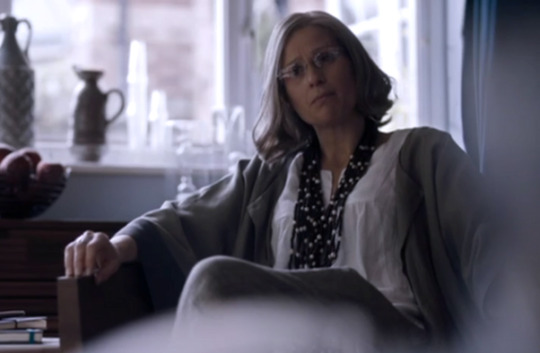
This one is perhaps the most straightforward on a symbolism level, but also possibly the most significant moment in the series. Therapist!Eurus, plain and simple, is Sherlock’s trauma prodding at John, interrogating him like a therapist would, trying to work him out – and largely failing, right? She can get basically nothing about how he feels about Sherlock out of him. But this is part of MP!Eurus’s ongoing project to get Sherlock to wake up – the Gay Trauma is interrogating John, trying to suss him, and failing.
Except, in the final scene of TLD, without the help of Therapist!Eurus, Sherlock has finally sussed John – it has taken until Culverton’s confession to recognise that John is suicidal without Sherlock (Chapter 9 X). The sigh of relief that is the hug scene (Chapter 10 X) is a kind of acknowledgement of that relief that he’s finally worked out what he’s been trying to cover up with drugs – so much so, that he misses the obvious, which is that John is suicidal again. When John leaves his cane with Sherlock in the hospital, it is a reminder of the first time he is suicidal, and Sherlock doesn’t make the immediate leap in his comatose haze that this is what his psyche has been trying to tell him. Hence you have this moment of immense relief and fade out at the end of the hug scene which suggests the end of the episode, and could feasibly end Sherlock’s life, except we’re started awake with a much more abrupt and troubling ending scene – Therapist!Eurus shooting John. Because, of course, if Sherlock is gone again, John must be suicidal again, and it has taken a few scenes of cognitive dissonance for this to clock. Indeed, it’s not Sherlock himself who clocks – Gay Trauma in the form of Eurus!Therapist returns and shoots John for us. This shooting isn’t, of course, permanent (in one of the worst cliffhanger resolutions in TV history), but that’s because it’s not real – it hasn’t happened yet. It is Sherlock, through MP!Eurus, finally recognising the problem – John.
This is particularly poignant in light of the opening and closing shots of TLD. Although there’s the fucky not-blood red that fills the screen at the end of TLD, apart from that the shots of Norbury shooting Mary and Therapist!Eurus shooting John are one and the same shot. It’s also a stylish shot (what I call split screen, but given that I never went to film school I think that’s just my name for it) and it’s repeated enough times over TLD that it’s pretty clear the creatives want it to be memorable. By the time John gets shot, then, we shouldn’t be caught up in the drama of it – we should be thinking, as so many did, “something’s fucky.”
And it is – but it’s brilliantly fucky! Head over to Chapter 7 X if you want to read about Norbury shooting Mary, but TLDR it’s a metaphor for Mary shooting Sherlock as understood from Sherlock’s warped and depressed perspective – and he’s finally realised what it means! The version in which Mary shooting Sherlock means John losing Mary (the Norbury version) is one in which John is sad, goes to therapy, and the world moves on. Now, however, that Sherlock has recognised that John was suicidal, he can also recognise that Mary shooting Sherlock will make John suicidal again – hence why it’s the same shot. Mary shooting Sherlock is the same as John dying – and the latter is much more important in Sherlock’s mind.
[It’s worth noting that the identical shots we see in TST and TLD don’t match the shot in HLV, although admittedly that one’s not in the MP – it does strike me, however, that the sounds are reversed – HLV sounds like a dart, whereas the MP shots sound like bullets. If anyone has any thoughts on that, do let me know – it has me flummoxed for the moment. If you want meta explaining why the shot from TST is the same as HLV, Chapter 7 is here X, and I’m certainly not the first to hypothesise this. For me, the TLD shot being the same is therefore a logical extension.]
#tjlc#chapter five: hey soul sister - who is eurus?#eurus holmes#meta#my meta#mine#bbc sherlock#johnlock#tjlc is real#bbc johnlock#e#mary#queer theory
30 notes
·
View notes
Text
Thoughts on Love, Victor Season 1
PSA: If you think that you might be gay, don’t get a girl emotionally invested! Please!
Ya know, at first when I thought about what I was going to write about this show, I thought that I should split the writings into the first half/last half of the show. Now I’m thinking “screw it”, if only because if I was going to go that route I should have stopped, parsed through my feelings about the first 5 episodes, and written those thoughts before proceeding with the next half. That, of course, did not happen, so to prevent the back half of the season’s events from miring the first half, I’ll just write about the whole shebang. There’s probably a joke about that word somewhere, I’ll try not to make it.
Anyways, let’s start by saying that on the whole, I really liked this show. It was not as good as Sex Education season 1, yet in my opinion waaaay better than HSMTMTS season 1. Most of the characters were likable and felt developed enough, it moved at a nice pace, and you can tell that a lot of heart went into this. Perhaps because we all watched this in a day, it felt like a 5 hour movie rather than a 10 episode tv show.
Additionally, I of course like the Latinx representation. The intersectionality of the Latinx community and the LGBTQ+ community has been presented on at least five TV shows to my knowledge: Ugly Betty, One Day at a Time, Diary of a Future President, The Baker and the Beauty, and now Love, Victor. Let’s keep it up!
As for the premise of the show itself, I *love* that this show acknowledges that Simon’s journey, at least at his house, was leaps and bounds easier than many other people’s. Victor’s parents are more conservative and religious, and they don’t have their shit together, so this is not the best environment to drop that bombshell in (which is why it was so incredible when Victor decides to do it anyway). Simon and Victor’s DM’s being a framing device for the show was a great way to tie the universe together.
The hook of Love, Simon was that you know all those cheesy and cliche rom-coms that straight people have gotten since the dawn of time? Well LGBT people deserve those stories too! Love, Victor is sort of presented with that same thesis in mind, which is why watching these episodes felt like different things I’ve seen before all over. The whole season ironically feels like Alex Strangelove: The TV Show, right down to the often cringy relationship with the girl, the openly gay love interest who conflicts our protagonist, and the goofball friend who chases after a girl who is seemingly out of his league.
Mia’s character felt a lot like Laila from All-American, being a black girl who is ordained as the hottest girl at school (which I feel like is a title only given in fictional schools), who also has a missing mother and problems with her rich dad. Pilar, on the other hand, feels like Casey from Atypical, in that she is openly rebellious in large part because of her mother’s infidelity.
Victor’s story this season sure was something to watch. The biggest question for me was, just how much sympathy should he be given? The world is inherently unfair to Victor. None of us should have to go through the agony and anxiety that so often comes with being in the closet and coming out. But for Victor to have visited those problems on Mia, who is going through things herself? That makes him pretty morally gray.
But he was still finding himself! But he loves Mia, just not like that! I get it, which is why he should have cut things off as soon as he got back from New York, no he should have cut things off when she asked him if there was “anything else” in her bedroom, no he should have cut things off when he literally felt like he and Benji were the only two people in the room at the concert, no he really shouldn’t have done this to begin with.
The line between Victor finding himself and him deceiving Mia is the conflict of the show, but the moment for me when I was like “Damn, Victor” was after he intentionally derailed Mia’s shebang-ing that she planned, he found the gall to lie to Benji and plan a seduction! That is why the season finale was so glorious. Because yes, while the world is unfair to Victor, he’s being unfair to the people around him.
I have made it a point not to read other people’s opinions extensively so as not to bias my own thoughts, but is Felix everybody else’s favorite? Felix’s character and arc was great. He was a supportive friend yet still felt like he had a story and stakes of his own, something which some TV shows get right (Sex Ed) and some TV shows get various shades of wrong (Jamie Johnson, Andi Mack). I like that he knew his worth and cut things off with Lake, and I like that she realized that her happiness with him should take priority over what others think of her.
I was soooo sympathetic to Mia. Her world is being turned upside down at home. Clearly, she has not even processed her mother being out of her life, and now her Dad is “replacing” her Mom while the baby is also “replacing” her! In Mia’s eyes, at least. Mia just needs to know that she is loved and appreciated. Which she *thought* of all people she’d be able to get from her boyfriend. Shucks.
As for the rest of Victor’s family, I also thought the parents’ storyline was pretty interesting yet unfortunate. Armando just can’t come around to trusting Isabel, which I actually kind of understand. Isabel, meanwhile, is being prevented from doing the thing she loves to do, which sucks especially because she’s in a radically new environment. Adrian is of course great, protect him at all costs. Pilar’s seemingly permanent mode of “angsty” is completely justified, as her friends back in TX are moving on just fine without her, she’s having trouble opening up and fitting in, and her family is WYLIN.
Some things that didn’t go so well for me was Andrew’s character, who feels like he’s just there to obstruct at any given moment. Y'all knew that when Victor and Benji were having that convo in the bathroom, someone was in the stall and someone was Andrew. Also, my guy, how are you not even somewhat aware that you are a total douchecanoe? I liked Benji, but Venji didn’t quite work for me because of all of the cheatation that it took to get there. Benji was pissed and ready to stay away from Victor permanently after the [attempted seduction], but once his relationship was over he was completely fine with putting his tongue down Mia’s boyfriend’s throat.
Overall, I really enjoyed this show. Some of these teen dramas I’m admittedly only watching for the LGBT content, so to have that be at the forefront of a show for once was amazing. The conflict was realistic if frustrating, and to me most of the characters seemed fully realized. Thankfully, the show didn’t even feel too “spin-offy” even with Nick Robinson being all over it.
In any given multi-season serialized show, the trajectory of the show goes one of two ways: the first season puts your feet on the ground of the series, and then later seasons go above and beyond with the storytelling (The Office, Breaking Bad, Bojack Horseman, Jamie Johnson) OR the first season is pretty great TV, and the following seasons fail to live up to its glory (The Good Place, Dear White People, really most every Netflix show ever). Which category Love, Victor ends up in is something to look forward to. Where do we go from here now that Victor is taking his first steps out of the closet?
Stray thoughts from the episodes:
The soundtrack on the whole, was not my cup of tea. I still liked a couple of songs, so that means somebody out there liked more of them.
I completely forgot Natasha Rothwell was in Love, Simon. More of her! More of Ali Wong! More of Beth Littleford! They were all great.
So Roger got his ass beat by Armando, and he still wants to get back with her?? Roger is reckless, man.
Speaking of reckless, Victor’s closet skills completely fell apart towards the end there. Assume somebody’s always watching!
Lake’s mother is a trip.
Good for the family for standing up to the grandparents.
Oh my god, Simon and Bram. Those guys are mine, and now they’re growing up and moving to the Big Gay City. They’ve come a long way.
Speaking of the Big Gay City, we were in Atlanta for a season and got *0* acknowledgement of the vibrant gay community there. More things to look forward to.
Was anybody else singing Selena along with Isabel? That is my favorite Selena song!
By rule of Felix being a male and Pilar being a female close in age, I immediately thought they were going to be a thing. The writers didn’t pull that thread too much...
That moment at the end there when we all thought Victor was going to hold off on his announcement only for him to go “fuck it” and say it anyways? And then he got to exhale? Perfect. chef’s kiss
What with June being Pride month, the SCOTUS ruling a couple of days ago, this entire show premiering today, and Delliot things going down in less than 24 hours, this will likely be the gayest week of the year. I suggest we all enjoy it.
Stay Peachy!
28 notes
·
View notes